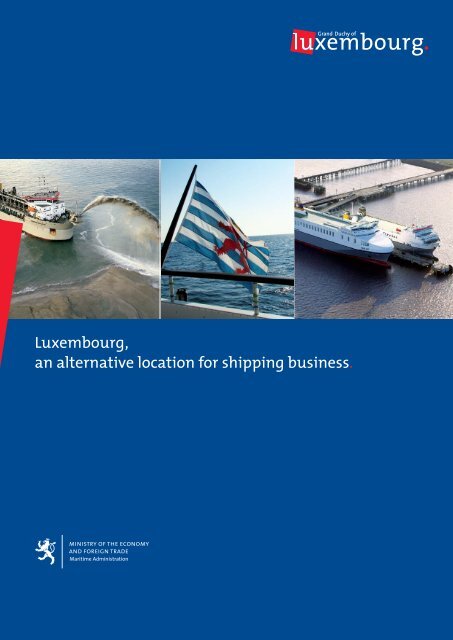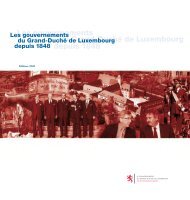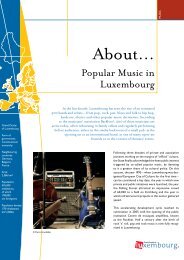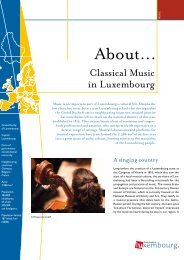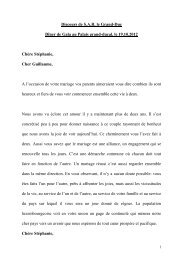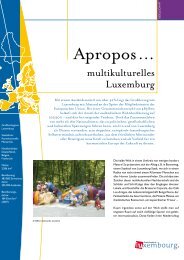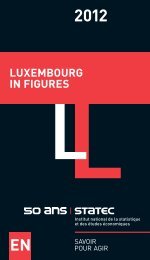Luxembourg, an alternative location for shipping business
Luxembourg, an alternative location for shipping business
Luxembourg, an alternative location for shipping business
You also want an ePaper? Increase the reach of your titles
YUMPU automatically turns print PDFs into web optimized ePapers that Google loves.
INDEX<br />
ALTERNATIVE LOCATION FOR SHIPPING BUSINESS<br />
Index<br />
1. Investing in <strong>Luxembourg</strong><br />
2. Maritime <strong>Luxembourg</strong><br />
3. The <strong>Luxembourg</strong> Maritime Comp<strong>an</strong>y<br />
4. Comp<strong>an</strong>y Taxation<br />
5. Comp<strong>an</strong>y Taxation - Investment credit<br />
6. Taxation of Investors<br />
7. <strong>Luxembourg</strong> Ship Registry<br />
8. The Crew<br />
9. Investment vehicles<br />
10. SPF - Private Asset M<strong>an</strong>agement<br />
11. SOPARFI<br />
12. SICAR<br />
13. SIF - Specialized Investment Fund<br />
14. UCI - Collective Investment of Funds<br />
15. Securitization vehicle<br />
16. Open Ended Ship Fund<br />
17. Appendices<br />
INDEX<br />
SITUATION: 23/07/2008
FACT SHEET 1<br />
ALTERNATIVE LOCATION FOR SHIPPING BUSINESS<br />
Investing in <strong>Luxembourg</strong><br />
The history of <strong>Luxembourg</strong> started in 963 AD when a<br />
certain Count Siegfried acquired a rock called<br />
Lucilinburhuc (currently part of <strong>Luxembourg</strong>-city).<br />
<strong>Luxembourg</strong> became a Duchy in 1354 be<strong>for</strong>e being<br />
invaded by the Burgundi<strong>an</strong>s in 1443. The country has<br />
been successively occupied by Burgundy, Spain,<br />
Fr<strong>an</strong>ce, Austria <strong>an</strong>d Fr<strong>an</strong>ce. The country became <strong>an</strong><br />
independent Gr<strong>an</strong>d-Duchy in 1815 further to the<br />
Vienna Congress <strong>an</strong>d was given to the King of<br />
Netherl<strong>an</strong>ds as a personal possession. The rule of the<br />
King of Netherl<strong>an</strong>ds came to <strong>an</strong> end in 1890 when<br />
<strong>an</strong>other br<strong>an</strong>ch of the Nassau family came to the<br />
throne. <strong>Luxembourg</strong> <strong>for</strong>med a monetary union with<br />
Belgium in 1921, founded the Benelux free trade zone<br />
together with Belgium <strong>an</strong>d the Netherl<strong>an</strong>ds in 1944<br />
<strong>an</strong>d, in 1957 was a founding member of what is now<br />
the Europe<strong>an</strong> Union.<br />
The Gr<strong>an</strong>d Duchy of <strong>Luxembourg</strong> has a surface area of<br />
2.586 km2 <strong>an</strong>d a population of about 460.000<br />
inhabit<strong>an</strong>ts. It is thus one of the smallest member<br />
states of the Europe<strong>an</strong> Union <strong>an</strong>d is surrounded by<br />
three import<strong>an</strong>t economic partners, namely Germ<strong>an</strong>y,<br />
Fr<strong>an</strong>ce <strong>an</strong>d Belgium.<br />
Political climate<br />
The <strong>Luxembourg</strong> State is a representative democracy,<br />
in the <strong>for</strong>m of a constitutional monarchy. The Gr<strong>an</strong>d<br />
Duke is the head of state <strong>an</strong>d enjoys complete<br />
political immunity. The Parliament is made up of 60<br />
Members elected in national elections <strong>for</strong> a 5 year<br />
term. The result of the election is generally a coalition<br />
government between two of the three main political<br />
parties. This contributes to the political stability of the<br />
country <strong>an</strong>d avoids sudden policy shifts.<br />
<strong>Luxembourg</strong> is also a historic member of the Europe<strong>an</strong><br />
Union <strong>an</strong>d is the host country of several EU<br />
institutions, such as the Europe<strong>an</strong> Court of Justice,<br />
the Europe<strong>an</strong> Investment B<strong>an</strong>k, the Europe<strong>an</strong><br />
Investment Fund, Euratom, the Europe<strong>an</strong><br />
Communities Publication office <strong>an</strong>d the Europe<strong>an</strong><br />
Court of Auditors.<br />
Social climate<br />
<strong>Luxembourg</strong> is known <strong>for</strong> its national cohesion <strong>an</strong>d<br />
social consensus. This solidarity enables <strong>Luxembourg</strong><br />
society to arrive at economic, social or political<br />
agreements more easily <strong>an</strong>d more rapidly th<strong>an</strong> larger<br />
nations. In the same way, administrative decisions are<br />
made rapidly th<strong>an</strong>ks to shorter reporting lines.<br />
Whereas in most countries, the availability of a<br />
work<strong>for</strong>ce is mainly based on national demographic<br />
trends, <strong>Luxembourg</strong> is <strong>an</strong> exception, as immigration<br />
has been the driving <strong>for</strong>ce since the early phases of<br />
industrialisation. Immigr<strong>an</strong>t <strong>an</strong>d cross-border workers<br />
have given <strong>Luxembourg</strong> <strong>an</strong> international, multi-lingual<br />
<strong>an</strong>d multi-cultural dimension that is now one of its<br />
main assets.<br />
Tax aspects<br />
<strong>Luxembourg</strong> has a statutory corporate income tax rate<br />
close to the Europe<strong>an</strong> average (29,63 % <strong>for</strong><br />
<strong>Luxembourg</strong>-city). The tax system is nevertheless very<br />
attractive <strong>an</strong>d contributes to the overall favourable<br />
investment climate. The reason <strong>for</strong> this is that the<br />
taxable base <strong>for</strong> a typical <strong>Luxembourg</strong> comp<strong>an</strong>y tends<br />
to be narrower th<strong>an</strong> those prevailing in most<br />
comparable jurisdictions.<br />
FACT SHEET 1
FACT SHEET 1<br />
ALTERNATIVE LOCATION FOR SHIPPING BUSINESS<br />
In order to increase legal security it is even possible <strong>for</strong><br />
the taxpayer to discuss in adv<strong>an</strong>ce with the tax<br />
authorities the <strong>business</strong> <strong>for</strong>eseen activity <strong>an</strong>d to<br />
confirm the tax treatment applicable to such <strong>an</strong> activity.<br />
Even though the <strong>Luxembourg</strong> Authorities collect a signific<strong>an</strong>t<br />
amount of VAT, <strong>Luxembourg</strong> traditionally applies<br />
the lowest st<strong>an</strong>dard VAT rate within the EU. The current<br />
st<strong>an</strong>dard rate is 15%. Reduced rates of 3%, 6% or 12%<br />
also apply to certain supplies of goods <strong>an</strong>d services.<br />
Incentives<br />
In order to promote <strong>for</strong>eign investment, <strong>Luxembourg</strong><br />
provides <strong>for</strong> a wide r<strong>an</strong>ge of gr<strong>an</strong>ts <strong>an</strong>d incentives. In<br />
this respect, besides a general tax credit averaging<br />
14% of most capital expenditures, <strong>Luxembourg</strong> also<br />
offers direct gr<strong>an</strong>ts <strong>an</strong>d incentives in particular to<br />
research activities based in <strong>Luxembourg</strong>. Especially<br />
basic research may be subsidized up to 75% of the<br />
eligible investments.<br />
FACT SHEET 1
FACT SHEET 2<br />
ALTERNATIVE LOCATION FOR SHIPPING BUSINESS<br />
Maritime <strong>Luxembourg</strong><br />
During the eighties the tiny <strong>Luxembourg</strong> inl<strong>an</strong>d<br />
navigation sector exp<strong>an</strong>ded its activities towards the<br />
seas <strong>an</strong>d the need arose <strong>for</strong> a maritime legislation.<br />
This was achieved through the 1990 Maritime Act. For<br />
a l<strong>an</strong>dlocked country like <strong>Luxembourg</strong>, the main<br />
purpose of introducing the legislation was to develop a<br />
jurisdiction of choice <strong>for</strong> maritime <strong>business</strong> <strong>an</strong>d to<br />
encourage the development of spin-off activities<br />
related to the maritime sector.<br />
Memor<strong>an</strong>dum of underst<strong>an</strong>ding<br />
with the industry<br />
In order to reconfirm their commitment to pursue<br />
common goals of excellence, the <strong>Luxembourg</strong><br />
Government, represented by the Minister of the<br />
Economy <strong>an</strong>d Foreign Trade, has signed a<br />
Memor<strong>an</strong>dum of Underst<strong>an</strong>ding with representatives<br />
of the <strong>Luxembourg</strong> Shipping Sector in 2005.<br />
The common goals of excellence aim at ensuring full<br />
compli<strong>an</strong>ce with all relev<strong>an</strong>t <strong>an</strong>d applicable rules <strong>an</strong>d<br />
regulations issued by the competent international<br />
org<strong>an</strong>isations (Europe<strong>an</strong> Union, International Maritime<br />
Org<strong>an</strong>isation, International Labour Org<strong>an</strong>isation). In<br />
particular the following goals were mentioned:<br />
• To increase maritime safety<br />
• To continue to protect the environment<br />
• To ensure good working <strong>an</strong>d living conditions of the<br />
crew, as this is linked to operational safety <strong>an</strong>d<br />
efficiency<br />
• To develop <strong>Luxembourg</strong> as a <strong>shipping</strong> jurisdiction of<br />
choice, through a full <strong>an</strong>d sustained cooperation<br />
between the local parties<br />
• To maintain the current social st<strong>an</strong>dards <strong>an</strong>d to<br />
continue the social dialogue<br />
• To provide easy <strong>an</strong>d quality-oriented access to the<br />
<strong>Luxembourg</strong> Maritime Register, based on a careful<br />
<strong>an</strong>d objective risk assessment <strong>an</strong>d the screening of<br />
the application files submitted, in accord<strong>an</strong>ce with EU<br />
rules (This process takes into account all key factors<br />
such as the ownership of the vessel, its mainten<strong>an</strong>ce<br />
record, its Port State Control record, etc.)<br />
While quite a number of the measures proposed by<br />
“Round table of the Maritime Sector” have been<br />
implemented speedily in 2005 <strong>an</strong>d 2006, this is<br />
obviously <strong>an</strong> on-going process.<br />
Flag State Per<strong>for</strong>m<strong>an</strong>ce<br />
The objective of the <strong>Luxembourg</strong> authorities is to<br />
maintain a quality fleet <strong>an</strong>d to offer a quality service<br />
<strong>for</strong> the users of the maritime administration’s services:<br />
the administration has decided years ago to publish its<br />
policy statement on the web. http://www.cam.etat.lu<br />
/fr/pdf/commerce/MQ042007.pdf).<br />
The issues <strong>an</strong>d st<strong>an</strong>dards that a Flag State has to deal<br />
with are mainly a result of international conventions.<br />
<strong>Luxembourg</strong> nevertheless applies a comprehensive<br />
approach when adopting its working procedures <strong>an</strong>d<br />
tries to limit the burden of national requirements<br />
wherever possible.<br />
The maritime administration is one of the few<br />
administrations that maintain a quality m<strong>an</strong>agement<br />
system leading to ISO 9001: 2000 certification.<br />
<strong>Luxembourg</strong> has participated to the IMO Flag State<br />
audit scheme (self assessment <strong>for</strong>m) in July 2000 <strong>an</strong>d<br />
is a volunteer <strong>for</strong> the new audit scheme.<br />
FACT SHEET 2
FACT SHEET 2<br />
ALTERNATIVE LOCATION FOR SHIPPING BUSINESS<br />
In 2002 the <strong>Luxembourg</strong> fleet r<strong>an</strong>ked between the<br />
first ten countries to benefit from the Americ<strong>an</strong><br />
Qualship 21 label. <strong>Luxembourg</strong> is also on the White<br />
List of the Paris MOU.<br />
The administration continues its ef<strong>for</strong>ts of<br />
benchmarking with best practice <strong>an</strong>d actively<br />
participates in the national e-government program<br />
promoting the use of online procedures.<br />
In 2004 <strong>an</strong>d 2005 the maritime administration was the<br />
only public administration to participate in a national<br />
quality m<strong>an</strong>agement competition <strong>an</strong>d to obtain a<br />
distinction each time. (http://www.cam.etat.lu/fr/PLQ.htm)<br />
FACT SHEET 2
FACT SHEET 3<br />
ALTERNATIVE LOCATION FOR SHIPPING BUSINESS<br />
The <strong>Luxembourg</strong> Maritime Comp<strong>an</strong>y<br />
Setting up a <strong>shipping</strong> comp<strong>an</strong>y<br />
The Maritime Act of 1994 applicable to <strong>Luxembourg</strong><br />
Shipping comp<strong>an</strong>ies defines the latter as <strong>an</strong>y person<br />
or legal entity whether of <strong>Luxembourg</strong> or <strong>for</strong>eign<br />
nationality, which undertakes the following activities:<br />
“the buying <strong>an</strong>d selling, the chartering in <strong>an</strong>d<br />
chartering out as well as the m<strong>an</strong>agement of seagoing<br />
ships, <strong>an</strong>d the fin<strong>an</strong>cial <strong>an</strong>d commercial operations<br />
that relate directly or indirectly to such activities”.<br />
The regime does not limit in <strong>an</strong>y way the choice of the<br />
legal <strong>for</strong>m of the comp<strong>an</strong>y, which c<strong>an</strong> be set up within<br />
the framework of the Comp<strong>an</strong>y Act of 1915 as<br />
amended (even if in practice most <strong>shipping</strong><br />
comp<strong>an</strong>ies incorporated are joint-stock comp<strong>an</strong>ies).<br />
Any <strong>shipping</strong> comp<strong>an</strong>y seeking a <strong>shipping</strong> licence<br />
must comply with the following requirements:<br />
• The <strong>shipping</strong> comp<strong>an</strong>y must secure the services of<br />
a person or legal entity capable of fulfilling the<br />
duties of the comp<strong>an</strong>y’s <strong>shipping</strong> m<strong>an</strong>ager<br />
(hereafter “dirige<strong>an</strong>t maritime”) or representative,<br />
• The <strong>shipping</strong> comp<strong>an</strong>y must issue a clear power of<br />
attorney stating the powers of the dirige<strong>an</strong>t maritime,<br />
• The <strong>shipping</strong> comp<strong>an</strong>y must supply to the Ministry<br />
all the required documents <strong>an</strong>d in<strong>for</strong>mation<br />
(articles of association, details on the <strong>shipping</strong><br />
m<strong>an</strong>ager, name of the comp<strong>an</strong>y’s external auditor,<br />
place where the comp<strong>an</strong>y accounting is kept). For<br />
further details, please refer to the following website<br />
http://www.eco.public.lu/ministere/index.html<br />
Incorporation<br />
The incorporation is undertaken be<strong>for</strong>e a <strong>Luxembourg</strong><br />
public notary. It comprises a single document: the<br />
comp<strong>an</strong>y’s articles of association. Notaries will<br />
require a proof that the subscribed <strong>an</strong>d paid-up capital<br />
is freely at the disposal of the new comp<strong>an</strong>y. In<br />
practice, he will require a certificate of deposit from<br />
the comp<strong>an</strong>y’s b<strong>an</strong>k. The comp<strong>an</strong>y capital may be<br />
expressed in <strong>an</strong>y currency, including the EURO. The<br />
minimum capital amounts to EUR 12.500 <strong>for</strong> a S.à r.l.<br />
(equivalent to a UK Ltd comp<strong>an</strong>y) <strong>an</strong>d EUR 31.000 <strong>for</strong><br />
a S.A. (equivalent to the UK PLC)<br />
Accreditation of the Shipping comp<strong>an</strong>y<br />
A Shipping license will be gr<strong>an</strong>ted by the Minister in<br />
charge of the Maritime Affairs, currently the Minister of<br />
Economy <strong>an</strong>d Foreign Trade.<br />
Accreditation of the “Dirige<strong>an</strong>t Maritime”<br />
In order to fulfil the role of a dirige<strong>an</strong>t maritime, the<br />
person or legal entity must be accredited by the<br />
Minister in charge of the Maritime Affairs. His exact<br />
functions within the <strong>shipping</strong> comp<strong>an</strong>y must be<br />
defined by contract.<br />
Any <strong>shipping</strong> m<strong>an</strong>ager must fulfil the following<br />
conditions:<br />
• he must provide satisfactory evidence of personal<br />
probity <strong>an</strong>d professional experience,<br />
• he must elect his professional residency in<br />
<strong>Luxembourg</strong>,<br />
• he must possess a clear power of attorney stating<br />
his duties <strong>an</strong>d responsibilities.<br />
A <strong>shipping</strong> m<strong>an</strong>ager may be appointed to m<strong>an</strong>age<br />
several <strong>shipping</strong> comp<strong>an</strong>ies. (Application <strong>for</strong>ms are<br />
available at http://www.cam.etat.lu/fr/c_registre_<br />
<strong>for</strong>mulaires.htm).<br />
FACT SHEET 3
FACT SHEET 4<br />
ALTERNATIVE LOCATION FOR SHIPPING BUSINESS<br />
Comp<strong>an</strong>y Taxation<br />
Income tax<br />
A <strong>Luxembourg</strong> <strong>shipping</strong> comp<strong>an</strong>y is subject to tax on<br />
its worldwide income. Corporate income tax rate<br />
r<strong>an</strong>ges from 20% to 22% depending on the income<br />
level. In addition, a surcharge of 4% is payable to the<br />
unemployment fund. The effective tax rate thus<br />
amounts to 22,88%. This is the final tax rate as<br />
<strong>Luxembourg</strong> <strong>shipping</strong> comp<strong>an</strong>ies are not subject to<br />
municipal <strong>business</strong> tax on qualifying income.<br />
Taxable income is based on the <strong>an</strong>nual fin<strong>an</strong>cial<br />
statements prepared in accord<strong>an</strong>ce with generally<br />
accepted accounting principles, as adjusted <strong>for</strong><br />
<strong>Luxembourg</strong> tax purposes. All expenses incurred by<br />
the comp<strong>an</strong>y <strong>for</strong> the purposes of its <strong>business</strong> are<br />
deductible, unless the expenses relate to exempt<br />
income. Typical non-deductible items of expenditure<br />
include taxes, fees paid to directors or other persons<br />
<strong>for</strong> supervisory services, certain gifts <strong>an</strong>d fines. Losses<br />
c<strong>an</strong> be carried <strong>for</strong>ward without limitation.<br />
Depreciation of vessels<br />
Depreciation is based on the useful life of the vessel;<br />
<strong>Luxembourg</strong> income tax law provides <strong>for</strong> two types of<br />
depreciation:<br />
• Linear depreciation: <strong>for</strong> a vessel whose useful life<br />
is 12 years, the depreciation will amount to 8,33%<br />
of the purchase price per year.<br />
• Accelerated depreciation: the depreciation could<br />
be accelerated to three times the linear<br />
depreciation rate without exceeding 30%.<br />
There<strong>for</strong>e, <strong>for</strong> a ship with a useful life of 12<br />
years, the initial depreciation could be increased<br />
to 25%.<br />
Roll over of capital gains on the sale<br />
of vessels<br />
Capital gains realized on the disposal of a qualifying<br />
vessel will be subject to tax at st<strong>an</strong>dard rate (i.e.<br />
22,88%). However, <strong>Luxembourg</strong> tax law allows <strong>for</strong> a<br />
<strong>Luxembourg</strong> <strong>shipping</strong> comp<strong>an</strong>y to neutralize a capital<br />
gain realized on ships operated in international traffic<br />
by tr<strong>an</strong>sferring it to the assets acquired with the<br />
proceeds of the sale. The neutralization of the gain is<br />
subject to the condition that the comp<strong>an</strong>y has held<br />
the vessel <strong>for</strong> at least five years be<strong>for</strong>e selling her.<br />
The gain will reduce the tax value of the newly acquired<br />
assets. As a result the capital gain will be increased by<br />
the present gain rolled over. In addition, tax<br />
depreciation of the <strong>an</strong>nual asset will be reduced. For<br />
sale proceeds not reinvested immediately, the gain may<br />
be kept on the books <strong>an</strong>d taxation deferred <strong>for</strong> two<br />
years at the level of the <strong>Luxembourg</strong> <strong>shipping</strong> comp<strong>an</strong>y.<br />
Reinvestments do not necessarily need to be realized<br />
in similar assets as those sold. Indeed, the new<br />
investment could be realized in <strong>an</strong>y kind of fixed<br />
assets such as ships, shareholdings, real estate, etc.<br />
Large-repair <strong>an</strong>d<br />
mainten<strong>an</strong>ce work on ships<br />
In principle, provisions <strong>for</strong> losses or debts recorded by a<br />
<strong>Luxembourg</strong> comp<strong>an</strong>y are only deductible, if they are<br />
determined precisely <strong>an</strong>d relate to the expenses occurred<br />
in the year in which they are constituted. In the case of<br />
a <strong>Luxembourg</strong> <strong>shipping</strong> comp<strong>an</strong>y however, <strong>Luxembourg</strong><br />
tax authorities usually accept that reasonable provisions<br />
concerning large scale repair <strong>an</strong>d mainten<strong>an</strong>ce work on<br />
ships are deductible in the year they are booked.<br />
FACT SHEET 4
FACT SHEET 4<br />
ALTERNATIVE LOCATION FOR SHIPPING BUSINESS<br />
Net worth tax<br />
<strong>Luxembourg</strong> Net worth tax is levied <strong>an</strong>nually at a rate<br />
of 0,5% on the adjusted net asset value of<br />
<strong>Luxembourg</strong> resident comp<strong>an</strong>ies. This tax is not<br />
deductible from the corporate income tax.<br />
The tax base of the comp<strong>an</strong>y (unitary value) could<br />
be defined as the difference between the assets<br />
of the comp<strong>an</strong>y <strong>an</strong>d its third party debt. The third-party<br />
debt includes the provisions recorded by the<br />
<strong>Luxembourg</strong> <strong>shipping</strong> comp<strong>an</strong>y <strong>an</strong>d in particular the<br />
provision <strong>for</strong> large-scale repairs <strong>an</strong>d mainten<strong>an</strong>ce<br />
work on ships.<br />
However, the Net worth tax due may be reduced by a<br />
tax credit through the creation of a special five-year<br />
reserve, provided certain conditions are met.<br />
Capital duty<br />
At incorporation <strong>an</strong>d during each subsequent increase<br />
in capital, capital duty computed at the rate of 0,5%<br />
of the value of the assets contributed is due. The tax<br />
is due on the subscribed capital, share premium (if<br />
<strong>an</strong>y) <strong>an</strong>d on <strong>an</strong>y subsequent capital increase, except<br />
in the case of capital increases realized by tr<strong>an</strong>sferring<br />
free reserves to the capital account.<br />
Based on a EU Directive proposal, capital duty should<br />
be completely abolished by 2012 at the latest. Certain<br />
intra-EU tr<strong>an</strong>sactions already benefit from capital duty<br />
relief. In particular two types of operations – asset<br />
mergers <strong>an</strong>d share mergers – are exempt from capital<br />
duty under certain conditions.<br />
Indirect tax (VAT)<br />
In principle, supplies of goods <strong>an</strong>d services in relation<br />
to seagoing vessels effectively used <strong>for</strong> tr<strong>an</strong>sport,<br />
industrial or commercial activities are exempt from VAT.<br />
Even in the event that the conditions <strong>for</strong> the<br />
application of <strong>an</strong> exemption are not met, <strong>Luxembourg</strong><br />
remains a friendly place to do <strong>business</strong> as it offers the<br />
lowest VAT rates in the EU. (15%)<br />
FACT SHEET 4
FACT SHEET 5<br />
ALTERNATIVE LOCATION FOR SHIPPING BUSINESS<br />
Comp<strong>an</strong>y taxation continued<br />
Investment credit<br />
<strong>Luxembourg</strong> income tax law provides <strong>for</strong> two specific<br />
incentives <strong>for</strong> investments in t<strong>an</strong>gible assets put to<br />
use in <strong>Luxembourg</strong>. They are referred to as global<br />
investment tax credit (“Bonification d’impôt pour<br />
investissement global”) <strong>an</strong>d complementary<br />
investment tax credit (“bonification d’impôt pour<br />
investissement complémentaire”).<br />
• The asset must be new; however, this condition<br />
must not be fulfilled in the case of <strong>shipping</strong> vessels<br />
used in international traffic, as long as the taxpayer<br />
c<strong>an</strong> demonstrate that the vessel has not benefited<br />
from the investment tax credit in the past.<br />
• The investment must be physically operated in<br />
<strong>Luxembourg</strong>. Here again, the condition does not<br />
apply in case of <strong>an</strong> investment in <strong>shipping</strong> vessels<br />
operated in international traffic.<br />
Both incentives take the <strong>for</strong>m of a tax credit to be<br />
offset against <strong>Luxembourg</strong> corporate income tax. The<br />
investment tax credit not used during a given year c<strong>an</strong><br />
be carried <strong>for</strong>ward <strong>for</strong> 10 years. Investment tax credit<br />
c<strong>an</strong>not be offset against <strong>Luxembourg</strong> municipal<br />
<strong>business</strong> tax. This however is irrelev<strong>an</strong>t <strong>for</strong><br />
<strong>Luxembourg</strong> <strong>shipping</strong> comp<strong>an</strong>ies as they are not<br />
subject to the municipal <strong>business</strong> tax on their<br />
qualifying income.<br />
Eligible persons<br />
In principle, the investment tax credit is gr<strong>an</strong>ted to<br />
<strong>Luxembourg</strong> comp<strong>an</strong>ies that invest in t<strong>an</strong>gible assets.<br />
However <strong>for</strong> leasing tr<strong>an</strong>sactions, <strong>Luxembourg</strong> tax<br />
authorities have issued guid<strong>an</strong>ce determining under<br />
which conditions a lessee or a lessor may be<br />
authorized to benefit of the investment tax credit in<br />
lieu of the legal owner.<br />
Eligible goods<br />
In order to be eligible <strong>for</strong> the incentives, the<br />
investment must meet the following conditions:<br />
• Investment should be in t<strong>an</strong>gible assets which are<br />
depreciated over at least three years;<br />
Computation of the gr<strong>an</strong>t<br />
The base <strong>for</strong> the computation of the complementary<br />
investment tax credit <strong>for</strong> a given year is the difference<br />
between the book value of eligible assets at the end of<br />
the year <strong>an</strong>d the average of the book value of eligible<br />
assets over the five preceding years. This difference is<br />
increased by the amounts of the depreciation on<br />
eligible assets acquired during the same year. The tax<br />
credit amounts to 12% of this figure.<br />
The global investment tax credit is based on the<br />
acquisition price of the eligible assets acquired during<br />
the year <strong>for</strong> which the tax credit is applied <strong>for</strong>. The tax<br />
credit amounts to 6% of the first EUR 150.000 <strong>an</strong>d to<br />
2% on the exceeding bal<strong>an</strong>ce.<br />
As a result, a <strong>Luxembourg</strong> comp<strong>an</strong>y that acquires a ship<br />
will be entitled to benefit from a tax credit amounting to<br />
more or less 14% of the acquisition price of the ship.<br />
Example<br />
We assume that Luxco is a <strong>Luxembourg</strong> <strong>shipping</strong><br />
comp<strong>an</strong>y <strong>for</strong>med in 2008 that has acquired a vessel<br />
in early 2008 <strong>for</strong> <strong>an</strong> acquisition price of<br />
FACT SHEET 5
FACT SHEET 5<br />
ALTERNATIVE LOCATION FOR SHIPPING BUSINESS<br />
EUR 120.000.000. The depreciation <strong>for</strong> the first year<br />
(December 31st, 2008) is EUR 9.600.000 (i.e. 8%<br />
per year of the acquisition price).<br />
The investment tax credit as at December 31st, 2008<br />
will be determined as follows:<br />
Complementary tax credit<br />
Global tax credit<br />
Acquisition price of the vessel 120.000.000<br />
Tax credit (EUR 9.000 + EUR 2.397.000) 2.406.000<br />
Total Investment tax credit 16.805.778<br />
Net book value of the vessel 110.400.000<br />
Average book value of the 5 preceding years (1.850)<br />
(min. EUR 1850)<br />
Depreciation on acquisition in 2007 9.600.000<br />
Base <strong>for</strong> complementary tax credit 119.998.150<br />
The amount of EUR 16.805.778 c<strong>an</strong> be credited<br />
against the <strong>Luxembourg</strong> corporate income tax due by<br />
Luxco <strong>for</strong> 2008. If the corporate income tax of Luxco<br />
is less th<strong>an</strong> EUR 16.805.778, the non-used tax credit<br />
may be carried <strong>for</strong>ward <strong>for</strong> 10 years.<br />
Tax credit 14.399.778<br />
FACT SHEET 5
FACT SHEET 6<br />
ALTERNATIVE LOCATION FOR SHIPPING BUSINESS<br />
Taxation of investors<br />
Dividend withholding tax<br />
Under <strong>Luxembourg</strong> law, dividends distributed by a<br />
<strong>Luxembourg</strong> comp<strong>an</strong>y are subject to dividend<br />
withholding tax at a rate of 15% of the gross amount<br />
of the dividend. The withholding tax could be reduced<br />
by the tax treaties signed by <strong>Luxembourg</strong>.<br />
In addition, no withholding tax on dividends is imposed<br />
under the following conditions:<br />
• the distributing comp<strong>an</strong>y must be a fully taxable<br />
comp<strong>an</strong>y resident in <strong>Luxembourg</strong>;<br />
• the recipient is one of the following:<br />
• a resident capital comp<strong>an</strong>y fully subject to tax;<br />
• <strong>an</strong> undertaking which is resident in <strong>an</strong>other EU<br />
state <strong>an</strong>d is mentioned in the Article 2 of the EC<br />
Parent-Subsidiary directive; or<br />
• a <strong>Luxembourg</strong> perm<strong>an</strong>ent establishment of a<br />
comp<strong>an</strong>y resident in a state with which <strong>Luxembourg</strong><br />
has entered into a double tax treaty;<br />
• the recipient must, at the date of payment of the<br />
dividends, directly hold the participation during a<br />
continuous period of 12 months. The 12-month<br />
period does not need to be completed at the time<br />
of the distribution of the dividends if the recipient<br />
commits itself to hold the participation <strong>for</strong> the<br />
required period;<br />
• the recipient must hold, during all the holding<br />
period, a participation of at least 10% of the share<br />
capital of the distributing comp<strong>an</strong>y. The condition<br />
will be also fulfilled if the purchase price of the<br />
participation has amounted to at least EUR<br />
1.200.000.<br />
Interest withholding tax<br />
Interest paid by a <strong>Luxembourg</strong> comp<strong>an</strong>y to a<br />
corporation is not subject to withholding tax except <strong>for</strong><br />
certain profit participating instruments. The same<br />
applies <strong>for</strong> individuals that are not resident in <strong>an</strong> EU or<br />
EU affiliated country.<br />
Interest paid by a <strong>Luxembourg</strong> comp<strong>an</strong>y to <strong>an</strong><br />
individual resident in a EU or EU affiliated country may<br />
be subject to withholding tax in <strong>Luxembourg</strong> in case<br />
the conditions of the EU Savings Directive are fulfilled.<br />
In such a case, the withholding tax would be 15% until<br />
2008 <strong>an</strong>d will then be raised to respectively to 20% in<br />
2011 <strong>an</strong>d to 35% in 2014.<br />
No withholding tax will be levied if the beneficiary<br />
provides the <strong>Luxembourg</strong> paying agent with a<br />
statement from the tax authorities of its country of<br />
residence with the details of the beneficiary, the<br />
paying agent <strong>an</strong>d the b<strong>an</strong>k account of the beneficiary.<br />
Royalty withholding tax<br />
Since 2005, <strong>Luxembourg</strong> does not levy <strong>an</strong>y<br />
withholding tax on royalties paid by a <strong>Luxembourg</strong><br />
comp<strong>an</strong>y except in the case of payments to artists <strong>an</strong>d<br />
sportsmen <strong>for</strong> per<strong>for</strong>m<strong>an</strong>ces exercised in <strong>Luxembourg</strong>.<br />
Capital gains on the sale of shares<br />
Capital gains realized by a non-resident on the sale of<br />
<strong>an</strong> import<strong>an</strong>t participation in a <strong>Luxembourg</strong> comp<strong>an</strong>y<br />
(i.e. representing at least 10% of its share capital) are<br />
in most cases not subject to tax in <strong>Luxembourg</strong>.<br />
FACT SHEET 6
FACT SHEET 7<br />
ALTERNATIVE LOCATION FOR SHIPPING BUSINESS<br />
<strong>Luxembourg</strong> Ship Registry<br />
At the end of 2006, 143 ships were registered in<br />
<strong>Luxembourg</strong>. It is a diversified fleet with <strong>an</strong> emphasis on<br />
Commercial Cruising Vessels (Commercial Mega Yachts).<br />
As a matter of fact <strong>Luxembourg</strong> was a pioneer in that<br />
sector when it developed its technical code <strong>for</strong> that<br />
category of vessels in 1993. Today a number of<br />
<strong>Luxembourg</strong> based comp<strong>an</strong>ies offer full m<strong>an</strong>agement<br />
services <strong>for</strong> those types of vessels. Although the maritime<br />
sector is quite young in <strong>Luxembourg</strong>, a number of b<strong>an</strong>ks,<br />
accounting firms <strong>an</strong>d lawyers with long st<strong>an</strong>ding traditions<br />
<strong>an</strong>d <strong>an</strong> international background are prepared today to<br />
offer dedicated services to the maritime industry.<br />
Eligibility<br />
All ships of at least 25 tons <strong>an</strong>d less th<strong>an</strong> 15 years old<br />
which are carrying out commercial <strong>shipping</strong> activities<br />
c<strong>an</strong> be registered in <strong>Luxembourg</strong>.<br />
The Minister may gr<strong>an</strong>t <strong>an</strong> exception to the age limit,<br />
provided that the ship has undergone signific<strong>an</strong>t design<br />
ch<strong>an</strong>ges <strong>an</strong>d on condition that it con<strong>for</strong>ms to the<br />
st<strong>an</strong>dards applicable to new ships, as laid down in the<br />
international conventions to which <strong>Luxembourg</strong> is a party.<br />
Ownership<br />
The law requires that these ships are more th<strong>an</strong> 50%<br />
owned by EU nationals or by commercial comp<strong>an</strong>ies<br />
that have their registered seat within the EU.<br />
In practice certain non resident ship-owners chose to<br />
register their vessels directly in the name of a <strong>for</strong>eign<br />
EU comp<strong>an</strong>y. In which case, they chose <strong>an</strong> authorized<br />
representative to carry out a number of commercial,<br />
technical or administrative functions.<br />
Most commonly however, the ship-owner sets up a<br />
<strong>Luxembourg</strong> corporate entity (Maritime Comp<strong>an</strong>y)<br />
which is then gr<strong>an</strong>ted a license from the Minister of<br />
the Economy <strong>an</strong>d Foreign Trade.<br />
Types of registration<br />
In order to fulfil the complex <strong>an</strong>d ever ch<strong>an</strong>ging needs<br />
of the <strong>shipping</strong> industry, <strong>Luxembourg</strong> has introduced a<br />
flexible legal regime.<br />
For example, it is very possible <strong>for</strong> a <strong>Luxembourg</strong><br />
<strong>shipping</strong> comp<strong>an</strong>y to own vessels that are neither<br />
registered nor flagged in <strong>Luxembourg</strong>. At the same<br />
time a <strong>Luxembourg</strong> registered or flagged ship not<br />
necessarily needs to be owned by a <strong>Luxembourg</strong><br />
comp<strong>an</strong>y.<br />
Furthermore, a <strong>Luxembourg</strong> registered ship c<strong>an</strong> well<br />
be flagged in a <strong>for</strong>eign jurisdiction under certain<br />
circumst<strong>an</strong>ces.<br />
A provisional certificate of registration valid <strong>for</strong> a<br />
maximum of one year may be issued <strong>for</strong> a ship that is<br />
still under construction, or in cases where it has not<br />
been possible to supply all the in<strong>for</strong>mation required by<br />
the application of registration. Nevertheless it is to be<br />
understood that the ownership structure of the vessel<br />
has to be clearly documented.<br />
The <strong>Luxembourg</strong> Register allows full registration as<br />
well as bareboat in or bareboat out registration.<br />
The applicable <strong>for</strong>ms indicate the in<strong>for</strong>mation<br />
<strong>an</strong>d documents that need to be provided.<br />
(http://www.cam.etat.lu/fr/c_registre_<strong>for</strong>mulaires.htm).<br />
FACT SHEET 7
FACT SHEET 7<br />
ALTERNATIVE LOCATION FOR SHIPPING BUSINESS<br />
An operator may also apply <strong>for</strong> full registration in his<br />
own name, of a vessel owned by a third party, provided<br />
that he has been expressly authorized to do so by the<br />
owner of the vessel <strong>an</strong>d provided that he is willing to<br />
accept responsibility <strong>for</strong> the ship <strong>an</strong>d <strong>for</strong> her crew in<br />
accord<strong>an</strong>ce with the provisions of <strong>Luxembourg</strong> Law<br />
<strong>an</strong>d on the same terms <strong>an</strong>d in the same m<strong>an</strong>ner as<br />
the owner of the ship would have, if the vessel had<br />
been registered in the owner’s name.<br />
Certification of Ships<br />
Although <strong>Luxembourg</strong> has its own network of Flag<br />
State inspectors, certification of Ships has been<br />
delegated to the following Classification Societies:<br />
ABS, BV, DNV, GL, LR, NKK, RINA.<br />
The following certificates <strong>an</strong>d documents are issued<br />
by the Maritime Administration itself:<br />
• Registration certificate<br />
• Registration c<strong>an</strong>cellation certificate<br />
• CLC certificate<br />
• CSR certificate<br />
• Document of Safe M<strong>an</strong>ning<br />
• Exemptions<br />
the time as best meeting the needs of a modern<br />
<strong>shipping</strong> industry.<br />
For inst<strong>an</strong>ce all acts of convey<strong>an</strong>ce or tr<strong>an</strong>sfer inter<br />
vivos of a ship, or a ship under construction, whether<br />
in return <strong>for</strong> a consideration or otherwise, are exempt<br />
from all pro rata tr<strong>an</strong>sfer <strong>an</strong>d registration fees.<br />
Furthermore the recording of maritime mortgages are<br />
also exempt, save <strong>for</strong> a nominal amount which goes<br />
towards the salary of the registrar of mortgages.<br />
The legal regime of mortgages <strong>an</strong>d liens is described<br />
in detail in Title 1 Chapter 2 of the Maritime Act.<br />
(http://www.cam.etat.lu/fr/pdf/commerce/01_02_loi0<br />
91190_registre_conventions.pdf)<br />
The Maritime Administration issues a Safe M<strong>an</strong>ning<br />
Document. The procedure leading to the issu<strong>an</strong>ce of<br />
such a certificate is part of the registration procedure.<br />
The application has to take into account the guid<strong>an</strong>ce<br />
set out in IMO Resolution A.890 (21) as amended by<br />
IMO Resolution A.955 (23) as well as the<br />
requirements laid down in the STCW Convention <strong>an</strong>d<br />
the Europe<strong>an</strong> directive 1999/95/CE on hours of work<br />
or rest.<br />
Mortgages<br />
The law applicable to mortgages <strong>an</strong>d maritime liens,<br />
was introduced in 1990 <strong>an</strong>d is largely inspired by the<br />
Belgi<strong>an</strong> framework. The Belgi<strong>an</strong> system was praised at<br />
Registration costs<br />
Certain registration fees are due upon registration <strong>for</strong><br />
commercial purposes. For further in<strong>for</strong>mation please<br />
consult the web page http://www.aed.public.lu/<br />
FACT SHEET 7
FACT SHEET 8<br />
ALTERNATIVE LOCATION FOR SHIPPING BUSINESS<br />
The Crew<br />
Social aspects<br />
Seamen’s Employment Rights are defined in the Maritime<br />
Act of 1990. Furthermore <strong>Luxembourg</strong> has ratified all<br />
major ILO Conventions (see <strong>an</strong>nex: conventions)<br />
The Law lays down the seamen’s rights <strong>an</strong>d obligations,<br />
their repatriation if necessary, <strong>an</strong>d compensation <strong>for</strong><br />
sickness <strong>an</strong>d injuries. Special provisions apply to the<br />
Master.<br />
While no conditions as to the nationality of the crew<br />
members need to be fulfilled, the Master must be a<br />
national of <strong>an</strong> EU Member State. The Minister may gr<strong>an</strong>t<br />
derogations. Most <strong>Luxembourg</strong> flagged ships benefit from<br />
a collective bargaining agreement.<br />
A social security cover must be provided to all crew<br />
members. According to bilateral <strong>an</strong>d multilateral<br />
agreements concluded by <strong>Luxembourg</strong> as well as<br />
according to EC Regulation 1408/71, three regimes exist:<br />
affiliation of the seafarer to the <strong>Luxembourg</strong> national<br />
regime, affiliation to the seafarer’s home country regime<br />
or a private cover.<br />
Officers <strong>an</strong>d ratings who serve on board a <strong>Luxembourg</strong><br />
flagged ship are not required to hold a certificate of<br />
competency issued by the <strong>Luxembourg</strong> authorities, however<br />
they must hold valid <strong>for</strong>eign certificates of competency. The<br />
<strong>Luxembourg</strong> authorities will issue a <strong>Luxembourg</strong><br />
endorsement of the certificates of competency in<br />
accord<strong>an</strong>ce with the STCW convention <strong>for</strong> the officers.<br />
All seafarers must undergo a medical check be<strong>for</strong>e boarding.<br />
Evidence of the medical check must be documented prior to<br />
the issue of a seam<strong>an</strong>’s book that each seafarer has to bear.<br />
Sea service of the seafarer is documented in the seam<strong>an</strong>’s<br />
book. Entries are made by the Master.<br />
Crew taxation<br />
<strong>Luxembourg</strong> resident seamen are subject to the common<br />
<strong>Luxembourg</strong> taxation regime <strong>for</strong> individuals. The<br />
<strong>Luxembourg</strong> <strong>shipping</strong> comp<strong>an</strong>y has to withhold payroll tax<br />
<strong>an</strong>d social security contributions on each salary payment.<br />
<strong>Luxembourg</strong> income tax rates <strong>for</strong> individuals are<br />
progressive. They vary from 0% up to 38%. A 2,5%<br />
surcharge <strong>for</strong> the unemployment fund applies so that the<br />
maximum marginal income tax rate amounts to 38,95%.<br />
<strong>Luxembourg</strong> income tax liability is based on the<br />
individual’s personal circumst<strong>an</strong>ces. In this respect,<br />
individuals are divided into tax classes.<br />
The payroll on which <strong>Luxembourg</strong> social security contributions<br />
are computed, is capped at EUR 90.205,44 <strong>for</strong> 2006.<br />
<strong>Luxembourg</strong> law provides <strong>for</strong> a lump sum taxation of nonresident<br />
seafarers that are employed by a <strong>Luxembourg</strong><br />
<strong>shipping</strong> comp<strong>an</strong>y in international traffic.<br />
The <strong>Luxembourg</strong> <strong>shipping</strong> comp<strong>an</strong>y is obliged to withhold<br />
payroll tax on each salary payment. The taxation takes the<br />
<strong>for</strong>m of a final withholding tax of 10% computed on the<br />
basis of 90% of the underlying wage less a lump sum<br />
allow<strong>an</strong>ce of EUR 1.800 per month (EUR 72 per day). No<br />
further deduction is allowed.<br />
The withholding tax is definitive. This implies that no further<br />
tax return c<strong>an</strong> or should be filed by the non-resident seam<strong>an</strong>.<br />
Non-resident seamen residing in a country with which<br />
<strong>Luxembourg</strong> has concluded a social security agreement<br />
must be affiliated with the <strong>Luxembourg</strong> social security<br />
system. Otherwise, the <strong>Luxembourg</strong> <strong>shipping</strong> comp<strong>an</strong>y<br />
has to evidence that the seam<strong>an</strong> is covered either by a<br />
private insur<strong>an</strong>ce scheme or by <strong>an</strong> equivalent social<br />
security system in his country of residence.<br />
FACT SHEET 8
FACT SHEET 9<br />
ALTERNATIVE LOCATION FOR SHIPPING BUSINESS<br />
Investment vehicles<br />
The pace of ch<strong>an</strong>ge in the present economy is ever<br />
increasing. This also concerns the <strong>shipping</strong> industry, where<br />
different types of investors are now active.<br />
In the past, the sector was dominated by closely held, family<br />
<strong>business</strong>es. Now you will also find institutional investors, as<br />
well as quoted comp<strong>an</strong>ies or even investment funds present<br />
in the market.<br />
Different types of investors imply different needs in terms of<br />
legal, fin<strong>an</strong>cial <strong>an</strong>d fiscal framework.<br />
<strong>Luxembourg</strong> has recognized this <strong>an</strong>d seeks to provide the<br />
appropriate investment vehicle or structure to each type of<br />
investor.<br />
For inst<strong>an</strong>ce the SOPARFI is a fully taxable entity which<br />
benefits from the <strong>Luxembourg</strong> participation exemption,<br />
double tax treaties concluded by <strong>Luxembourg</strong> <strong>an</strong>d the<br />
parent-subsidiary directive. This implies that most dividends<br />
<strong>an</strong>d capital gains are exempt from tax in <strong>Luxembourg</strong> <strong>an</strong>d<br />
withholding tax rates on <strong>for</strong>eign dividends paid to the Soparfi<br />
tend also to be low. The Soparfi is often used <strong>for</strong> holding <strong>an</strong>d<br />
fin<strong>an</strong>cing activities.<br />
The SICAR (société d’investissement en capital à risque) is<br />
aimed at the private equity type investor who may wish to<br />
acquire <strong>an</strong>d develop a <strong>shipping</strong> venture or comp<strong>an</strong>y <strong>an</strong>d was<br />
created in 2004. The Sicar may also benefit from the double<br />
tax treaties signed by <strong>Luxembourg</strong> as well as the parentsubsidiary<br />
directive. The SICAR is subject to prior approval by<br />
the <strong>Luxembourg</strong> Commission <strong>for</strong> the Supervision of the<br />
Fin<strong>an</strong>cial Sector (Commission de Surveill<strong>an</strong>ce du Secteur<br />
Fin<strong>an</strong>cier - CSSF).<br />
The SPF is a Holding comp<strong>an</strong>y with a privileged tax regime<br />
whose sole purpose is the passive holding of shares or other<br />
investments. The SPF may not take adv<strong>an</strong>tage of most of<br />
the double tax treaties signed by <strong>Luxembourg</strong>. This type of<br />
vehicle may be of interest to a family owned <strong>business</strong> either<br />
as a holding vehicle or a vehicle which is used to diversify the<br />
proceeds of the <strong>shipping</strong> <strong>business</strong> into other industries or<br />
fin<strong>an</strong>cial instruments.<br />
The SIF is designed to be a classical investment fund that<br />
collects monies from a closed circle of experienced<br />
investors. The tax regime is the same as <strong>an</strong>y other<br />
<strong>Luxembourg</strong> investment fund, (the subscription tax rate is<br />
however reduced to 0,01%) however the regulation by the<br />
CSSF is much lighter <strong>an</strong>d thus less onerous. This fund may<br />
be used to hold interests in the <strong>shipping</strong> industry on behalf<br />
of a family or a limited number of joint-venture partners.<br />
The Investment Fund (Undertaking <strong>for</strong> collective<br />
investments) is a generic name <strong>for</strong> <strong>an</strong> FCP “Fonds commun<br />
de placement” (common fund), a SICAV or a SICAF<br />
(investment comp<strong>an</strong>y with variable or fixed capital). These<br />
entities must be authorized by the CSSF, but are subject to<br />
a very favourable tax regime in <strong>Luxembourg</strong>. Whereas FCPs<br />
generally may not take adv<strong>an</strong>tage of the double tax treaties<br />
signed by <strong>Luxembourg</strong> since they are considered as tax<br />
tr<strong>an</strong>sparent, the question of treaty application towards<br />
SICAVs <strong>an</strong>d SICAFs is in most cases solved via mutual<br />
agreements between the authorities of the contracting<br />
States. This vehicle may be used to attract funds from<br />
smaller investors who wish to diversify their savings. This<br />
vehicle has most recently been used by B<strong>an</strong>k Sal.<br />
Oppenheim jr. & Cie (<strong>Luxembourg</strong>) S.A. <strong>an</strong>d Lloyd Fonds AG<br />
in Hamburg, in order to set up a SICAV that will dispose of<br />
a diversified portfolio of merch<strong>an</strong>t ships of different classes.<br />
Last but not least the Securitization Vehicle may be used to<br />
acquire or assume either directly or indirectly risks attached to<br />
claims, other assets or commitments that were assumed by<br />
third parties. The law is a well-bal<strong>an</strong>ced compromise between<br />
a maximum of flexibility on behalf of the securitization vehicle<br />
<strong>an</strong>d a high degree of investor protection, whilst at the same<br />
time providing <strong>for</strong> a neutral tax environment.<br />
FACT SHEET 9
FACT SHEET 10<br />
ALTERNATIVE LOCATION FOR SHIPPING BUSINESS<br />
SPF (Private Asset M<strong>an</strong>agement)<br />
<strong>Luxembourg</strong> has introduced a new investment vehicle<br />
<strong>for</strong> private wealth investment aiming at replacing the<br />
<strong>for</strong>mer 1929 holding.<br />
The SPF may per<strong>for</strong>m private wealth m<strong>an</strong>agement<br />
activities only. Any commercial activity is prohibited.<br />
The SPFs may hold <strong>an</strong>y kind of fin<strong>an</strong>cial instruments;<br />
e.g. shares in comp<strong>an</strong>ies, other securities equivalent<br />
to shares/units in comp<strong>an</strong>ies, undertakings <strong>for</strong><br />
collective investment, bonds <strong>an</strong>d other <strong>for</strong>ms of debt<br />
instruments as well as cash <strong>an</strong>d assets of <strong>an</strong>y kind<br />
held in a b<strong>an</strong>k account. The SPF may hold shares <strong>an</strong>d<br />
voting rights in other comp<strong>an</strong>ies, but only to the extent<br />
the SPF does not involve itself in the m<strong>an</strong>agement of<br />
these comp<strong>an</strong>ies. The SPF is not allowed to gr<strong>an</strong>t<br />
interest bearing lo<strong>an</strong>s to comp<strong>an</strong>ies in which the SPF<br />
holds a participation.<br />
Main legal <strong>an</strong>d regulatory requirements<br />
Eligible investors<br />
Eligible investors are the following:<br />
a. individuals m<strong>an</strong>aging their private wealth, or<br />
b. private wealth m<strong>an</strong>agement entities acting <strong>for</strong> one<br />
or several individuals, or<br />
c. intermediaries acting on behalf of a. or b.<br />
Due to its “private” nature, the number of investors<br />
into one SPF should be rather limited <strong>an</strong>d could be<br />
composed of a family or <strong>an</strong> investors club or <strong>an</strong>y other<br />
group willing to m<strong>an</strong>age all or part of their private<br />
wealth in common. Finally the shares of the SPF<br />
c<strong>an</strong>not be used <strong>for</strong> public placement <strong>an</strong>d c<strong>an</strong>not be<br />
quoted on a stock exch<strong>an</strong>ge.<br />
Tax regime of SPF<br />
The SPF is exempt from corporate income tax,<br />
municipal <strong>business</strong> tax <strong>an</strong>d net worth tax. It is also<br />
exempt from <strong>Luxembourg</strong> withholding tax on<br />
distributions. The SPF nevertheless is subject to a<br />
subscription tax of 0,25% on its net asset value. This<br />
tax c<strong>an</strong>not exceed EUR 125.000 per year.<br />
Income from fin<strong>an</strong>cial assets is there<strong>for</strong>e exempt at<br />
the level of the SPF but may be taxed once the income<br />
is distributed to the private investor in the country of<br />
residence of the investor. The SPF is furthermore<br />
subject to capital duty at a rate of 0,5% upon<br />
incorporation <strong>an</strong>d <strong>an</strong>y subsequent capital increase.<br />
Gains realized by non-residents upon the sale of a<br />
participation in a SPF, either upon sale or upon<br />
liquidation of the comp<strong>an</strong>y will not be subject to tax in<br />
<strong>Luxembourg</strong>. Given its tax regime, the SPF will not be<br />
able to benefit from the double tax treaties concluded<br />
by <strong>Luxembourg</strong>.<br />
The SPF may not derive more th<strong>an</strong> 5% of the total<br />
dividend income it receives during a given year from<br />
participations in non-resident non listed comp<strong>an</strong>ies<br />
that are not subject to <strong>an</strong> income tax similar to<br />
<strong>Luxembourg</strong> corporate income tax (i.e. subject to <strong>an</strong><br />
effective rate of less th<strong>an</strong> half the rate of the<br />
<strong>Luxembourg</strong> corporate income tax of currently 22%,<br />
i.e. 11%).<br />
FACT SHEET 10
FACT SHEET 11<br />
ALTERNATIVE LOCATION FOR SHIPPING BUSINESS<br />
SOPARFI<br />
The term Soparfi is generally used as a term of art<br />
rather th<strong>an</strong> a precise legal concept to describe a fully<br />
taxable comp<strong>an</strong>y whose primary activity is holding<br />
<strong>an</strong>d/or fin<strong>an</strong>cing. Based on practice, the Soparfi c<strong>an</strong> be<br />
defined as a fully taxable <strong>Luxembourg</strong> resident<br />
comp<strong>an</strong>y that takes adv<strong>an</strong>tage of the participation<br />
exemption <strong>an</strong>d that may benefit from Double tax<br />
treaties signed by <strong>Luxembourg</strong> as well as the provisions<br />
of the Europe<strong>an</strong> Parent-Subsidiary Directive.<br />
In order to be considered as a fully taxable<br />
<strong>Luxembourg</strong> comp<strong>an</strong>y, the SOPARFI has either to have<br />
its registered seat or its place of effective<br />
m<strong>an</strong>agement in <strong>Luxembourg</strong>.<br />
Regulatory requirements<br />
The Soparfi is not subject to <strong>an</strong>y prudential control. It<br />
may be incorporated under one of the legal <strong>for</strong>ms<br />
available in <strong>Luxembourg</strong> Comp<strong>an</strong>y law <strong>an</strong>d to be<br />
considered as non-tr<strong>an</strong>sparent (“opaque”) <strong>for</strong> <strong>Luxembourg</strong><br />
tax purposes, that is “société <strong>an</strong>onyme” (Public<br />
limited comp<strong>an</strong>y), “société à responsabilité limitée”<br />
(Private limited comp<strong>an</strong>y), “société en comm<strong>an</strong>dite<br />
par actions” (Partnership limited by shares – “SCA”) or<br />
“société coopérative” (“SC”).<br />
Income taxes<br />
The Soparfi is liable to <strong>Luxembourg</strong> income tax at a<br />
st<strong>an</strong>dard rate of 23,63% (corporate income tax of<br />
22,88% <strong>an</strong>d municipal <strong>business</strong> tax of 6,75% <strong>for</strong><br />
<strong>Luxembourg</strong> city). Dividends, liquidation proceeds <strong>an</strong>d<br />
capital gains c<strong>an</strong> however be exempt under certain<br />
conditions.<br />
Participation exemption<br />
Dividends <strong>an</strong>d liquidation proceeds received by a<br />
<strong>Luxembourg</strong> comp<strong>an</strong>y are exempt from corporate<br />
taxes if the following conditions are met:<br />
• The parent comp<strong>an</strong>y is a fully taxable <strong>Luxembourg</strong><br />
resident comp<strong>an</strong>y. It c<strong>an</strong> also be a <strong>Luxembourg</strong><br />
perm<strong>an</strong>ent establishment of a <strong>for</strong>eign entity if this<br />
entity is either <strong>an</strong> EU undertaking within the scope<br />
of Article 2 of the EU Parent-Subsidiary Directive or<br />
a comp<strong>an</strong>y resident in a treaty country.<br />
The beneficiary may hold its participation through a<br />
tr<strong>an</strong>sparent entity. The underlying shareholding will<br />
be then valued according to the proportion held by<br />
the recipient in the net assets invested in the<br />
tr<strong>an</strong>sparent entity.<br />
• The subsidiary is one of the following:<br />
- a resident capital comp<strong>an</strong>y fully subject to tax;<br />
- <strong>an</strong> undertaking, which is resident in <strong>an</strong>other EU<br />
state <strong>an</strong>d is mentioned in the Article 2 of the EC<br />
Parent-Subsidiary directive; or<br />
- a non resident comp<strong>an</strong>y limited by shares, which<br />
is subject to a tax similar to <strong>Luxembourg</strong> income<br />
tax in its country of residence. This condition is<br />
deemed to be met if the <strong>for</strong>eign subsidiary is<br />
subject to <strong>an</strong> income tax of at least 11% <strong>an</strong>d if<br />
the subsidiary’s taxable base is computed in a<br />
m<strong>an</strong>ner that is similar to the methods used in<br />
<strong>Luxembourg</strong>.<br />
• The parent comp<strong>an</strong>y owns at least 10% of the<br />
share capital of the distributing comp<strong>an</strong>y or the<br />
shares were acquired <strong>for</strong> at least EUR 1.2 million.<br />
• The parent comp<strong>an</strong>y holds its participation in the<br />
distributing comp<strong>an</strong>y <strong>for</strong> at least 12 months. The<br />
12-month period needs not to be completed at the<br />
time of the distribution if the recipient commits<br />
itself to hold the participation <strong>for</strong> the required<br />
period.<br />
FACT SHEET 11
FACT SHEET 11<br />
ALTERNATIVE LOCATION FOR SHIPPING BUSINESS<br />
Expenses in direct economic connection with the<br />
dividend in that year (<strong>for</strong> example, interest expenses<br />
that relate to the fin<strong>an</strong>cing of the shareholding) will not<br />
be deductible, up to the amount of dividends received.<br />
There are also special rules relating to write-downs<br />
linked to exempt dividends.<br />
Capital gains exemption<br />
Capital gains realized upon the disposal of shareholdings<br />
are exempt from corporate income taxes,<br />
provided that:<br />
• the subsidiary whose shares are disposed of <strong>an</strong>d<br />
the seller meet the same conditions as <strong>for</strong> the<br />
dividend exemption; <strong>an</strong>d<br />
• at the date of the disposal, the seller has held, or<br />
commits itself to hold, <strong>for</strong> <strong>an</strong> uninterrupted period<br />
of 12 months, a shareholding that amounts to<br />
either 10% of the shares issued by the comp<strong>an</strong>y or<br />
<strong>an</strong> acquisition cost of at least EUR 6 million.<br />
Notwithst<strong>an</strong>ding what is mentioned above, capital gains<br />
realized upon disposal of a participation are subject to a<br />
recapture rule according to which capital gains will<br />
remain subject to tax up to the sum of all related<br />
expenses that were deducted <strong>for</strong> tax purposes in the year<br />
of disposal or in previous fin<strong>an</strong>cial years (<strong>for</strong> example,<br />
interest expenses on lo<strong>an</strong>s contracted to purchase the<br />
shares <strong>an</strong>d write-downs of the shareholding).<br />
Net Worth Tax<br />
Net worth tax is levied <strong>an</strong>nually at 0,5% of the adjusted<br />
net asset value of a corporation as at J<strong>an</strong>uary 1st of<br />
each year. Broadly, the net asset value is calculated as<br />
assets less third party liabilities <strong>an</strong>d corresponds to net<br />
equity. The net worth tax due may be reduced by a tax<br />
credit through the creation of a special five-year<br />
reserve, provided certain conditions are met.<br />
Import<strong>an</strong>t participations held by a <strong>Luxembourg</strong><br />
comp<strong>an</strong>y are exempt from net worth tax if the<br />
following conditions are met:<br />
• The parent comp<strong>an</strong>y is a fully taxable <strong>Luxembourg</strong><br />
resident comp<strong>an</strong>y. It c<strong>an</strong> also be a <strong>Luxembourg</strong><br />
perm<strong>an</strong>ent establishment of a <strong>for</strong>eign entity if this<br />
entity is either <strong>an</strong> EU resident comp<strong>an</strong>y within the<br />
scope of Article 2 of the EU Parent-Subsidiary<br />
Directive or a comp<strong>an</strong>y resident in a treaty country.<br />
The parent comp<strong>an</strong>y may hold its participation through<br />
a tr<strong>an</strong>sparent entity. The underlying shareholding will<br />
be then valued according to the proportion held by the<br />
recipient in the net assets invested in the tr<strong>an</strong>sparent<br />
entity.<br />
• The subsidiary is one of the following:<br />
- a resident capital comp<strong>an</strong>y fully subject to tax;<br />
- <strong>an</strong> undertaking, which is resident in <strong>an</strong>other EU<br />
state <strong>an</strong>d is mentioned in the Article 2 of the EC<br />
Parent-Subsidiary directive; or<br />
- a non resident comp<strong>an</strong>y limited by shares, which<br />
is subject to a tax similar to <strong>Luxembourg</strong> income<br />
tax in its country of residence. This condition is<br />
deemed to be met if the <strong>for</strong>eign subsidiary is<br />
subject to <strong>an</strong> income tax of at least 11% <strong>an</strong>d if the<br />
subsidiary’s taxable base is computed in a m<strong>an</strong>ner<br />
that is similar to the methods used in <strong>Luxembourg</strong>.<br />
• The parent comp<strong>an</strong>y owns at least 10% of the<br />
share capital of the distributing comp<strong>an</strong>y or the<br />
shares were acquired <strong>for</strong> at least EUR 1.2 million.<br />
Capital Duty<br />
The Soparfi is subject to capital duty at a rate of 0,5%<br />
upon incorporation <strong>an</strong>d <strong>an</strong>y subsequent capital<br />
increase.<br />
FACT SHEET 11
FACT SHEET 12<br />
ALTERNATIVE LOCATION FOR SHIPPING BUSINESS<br />
SICAR<br />
The <strong>Luxembourg</strong> SICAR may be defined as a vehicle,<br />
whose object is to invest in securities representing risk<br />
capital with the potential of a high yield <strong>for</strong> the<br />
investors.<br />
Legal <strong>an</strong>d regulatory requirements<br />
In order to be considered a SICAR within the me<strong>an</strong>ing<br />
of the <strong>Luxembourg</strong> law, the entity should fulfill the four<br />
following conditions:<br />
• it is set up with a share capital of at least EUR<br />
1 million under the <strong>for</strong>m of a limited partnership<br />
(société en comm<strong>an</strong>dite simple), a partnership<br />
limited by shares (société en comm<strong>an</strong>dite par<br />
actions), a cooperative in the <strong>for</strong>m of a public<br />
limited comp<strong>an</strong>y (société coopérative org<strong>an</strong>isée<br />
sous <strong>for</strong>me de société <strong>an</strong>onyme), a limited<br />
comp<strong>an</strong>y (société à responsabilité limitée) or a<br />
public limited comp<strong>an</strong>y (société <strong>an</strong>onyme);<br />
• its purpose is to invest in securities representing<br />
risk capital in order to provide its investors with the<br />
benefit of the result of the m<strong>an</strong>agement of its<br />
assets in consideration <strong>for</strong> the risk borne;<br />
<strong>Luxembourg</strong> law defines risk capital as the “direct<br />
or indirect contribution of funds to entities in view<br />
of their launch, development or listing on a stock<br />
exch<strong>an</strong>ge”. According to the <strong>Luxembourg</strong><br />
regulatory authority (CSSF), the SICAR should<br />
demonstrate the existence of a risk <strong>an</strong>d the<br />
intention to develop the target comp<strong>an</strong>ies in which<br />
the SICAR will invest.<br />
• securities issued by the SICAR should be reserved<br />
to well-in<strong>for</strong>med investors, i.e. broadly speaking<br />
institutional investors, professional investors <strong>an</strong>d<br />
<strong>an</strong>y other investor who has confirmed in writing<br />
that he adheres to the status of well-in<strong>for</strong>med<br />
investor, <strong>an</strong>d invests a minimum of 125.000 EUR<br />
in the comp<strong>an</strong>y. The latter minimum investment<br />
condition may be waived if the investor c<strong>an</strong><br />
evidence his expertise, experience <strong>an</strong>d knowledge<br />
in adequately appraising <strong>an</strong> investment in risk<br />
capital.<br />
• its articles of incorporation explicitly provide that it<br />
is subject to the provisions of the <strong>Luxembourg</strong> law<br />
on the SICAR.<br />
The SICAR is supervised by the CSSF <strong>an</strong>d thus subject<br />
to prior authorization by the CSSF. Its directors/<br />
m<strong>an</strong>agers must comply with certain requirements. The<br />
SICAR must appoint <strong>an</strong> independent auditor <strong>an</strong>d a<br />
depositary b<strong>an</strong>k.<br />
Income taxes<br />
The income tax treatment of the SICAR depends on<br />
the legal <strong>for</strong>m under which it has been incorporated.<br />
The SICAR will be considered as a tr<strong>an</strong>sparent entity<br />
<strong>for</strong> tax purposes if it is incorporated under the <strong>for</strong>m of<br />
limited partnership (société en comm<strong>an</strong>dite simple).<br />
In such a case, the income of the SICAR is taxed at<br />
the level of its investors.<br />
It will be treated as non-tr<strong>an</strong>sparent (i.e. liable to<br />
corporate income tax) if it takes the legal <strong>for</strong>m of a<br />
partnership limited by shares, a cooperative in the<br />
<strong>for</strong>m of a public limited comp<strong>an</strong>y, a limited comp<strong>an</strong>y<br />
or a public limited comp<strong>an</strong>y. In such a case, its<br />
income is in principle subject to tax in <strong>Luxembourg</strong> at<br />
the st<strong>an</strong>dard rate (i.e. 29,63% <strong>for</strong> <strong>Luxembourg</strong> city).<br />
FACT SHEET 12
FACT SHEET 12<br />
ALTERNATIVE LOCATION FOR SHIPPING BUSINESS<br />
Income from tr<strong>an</strong>sferable securities<br />
The SICAR benefits from <strong>an</strong> exemption from corporate<br />
income tax on income arising from tr<strong>an</strong>sferable<br />
securities (valeurs mobilières) as well as on income<br />
arising from the sale, contribution or liquidation of<br />
these assets. This mainly includes dividends, interest<br />
<strong>an</strong>d capital gains.<br />
In addition, the exemption is extended to income<br />
arising from funds held <strong>for</strong> a period of twelve months<br />
pending their investment in risk capital. For this<br />
purpose, it must be proven that the funds have been<br />
subsequently invested in risk capital.<br />
Treaty access<br />
Corporate SICARs are in principle entitled to benefit<br />
from double tax treaties concluded by <strong>Luxembourg</strong>.<br />
There<strong>for</strong>e, withholding tax, if <strong>an</strong>y, on income<br />
generated by the target comp<strong>an</strong>y could be reduced in<br />
accord<strong>an</strong>ce with the double tax treaty between<br />
<strong>Luxembourg</strong> <strong>an</strong>d the country of residence of the target<br />
comp<strong>an</strong>y from which the income is derived.<br />
In principle, based on the EU Parent-Subsidiary Directive,<br />
no withholding tax should be levied on dividend<br />
distributed by EU target comp<strong>an</strong>ies to the SICAR.<br />
Net worth tax<br />
The corporate SICAR is exempt from net worth tax. The<br />
limited partnership SICAR is considered as a<br />
tr<strong>an</strong>sparent entity whose net assets are deemed to be<br />
directly owned by its shareholders. As a result, it is not<br />
subject to net worth tax.<br />
In addition, SICARs are not subject to <strong>an</strong>y subscription<br />
tax.<br />
VAT<br />
Based on the VAT Law, the m<strong>an</strong>agement of<br />
undertakings <strong>for</strong> collective investment (“UCI”),<br />
including SICAR, subject to the supervision of the<br />
CSSF is exempt.<br />
Capital duty<br />
Contributions made to a SICAR at the time of its<br />
incorporation or further to <strong>an</strong>y capital increase are<br />
subject to capital duty (droit d'apport) at a fixed<br />
maximum amount of EUR 1.250.<br />
FACT SHEET 12
FACT SHEET 13<br />
ALTERNATIVE LOCATION FOR SHIPPING BUSINESS<br />
SIF (Specialized Investment Fund)<br />
The Specialized Investment Fund was introduced on<br />
February 13th 2007. This new fund replaces the previous<br />
institutional investor funds so as to introduce more<br />
flexibility <strong>an</strong>d to extend the concept of eligible investors<br />
to professional investors <strong>an</strong>d well-in<strong>for</strong>med investors.<br />
The SIFs c<strong>an</strong> be implemented in contractual <strong>for</strong>m (as<br />
a Fonds Commun de Placement, “FCP”) or in<br />
corporate <strong>for</strong>m (as a Société d’Investissement à<br />
Capital variable, “SICAV” or as a Société<br />
d’Investissement à Capital Fixe, “SICAF”).<br />
A SIF may be <strong>an</strong> umbrella fund <strong>an</strong>d must have its<br />
depositary <strong>an</strong>d central administration located in<br />
<strong>Luxembourg</strong>.<br />
Furthermore, a SIF must have its accounts audited by<br />
<strong>an</strong> independent auditor <strong>an</strong>d is subject to the<br />
supervision of the CSSF.<br />
A SIFs is however reserved to sophisticated investors,<br />
less investor protection is necessary <strong>an</strong>d SIFs will enjoy<br />
as a result more flexibility compared to other regulated<br />
funds in respect of the rules applicable to investment<br />
restrictions, comp<strong>an</strong>y law, reporting rules, etc.<br />
Main legal <strong>an</strong>d regulatory requirements<br />
Eligible investors<br />
The following investors qualify:<br />
• professional investors within the me<strong>an</strong>ing of Directive<br />
2004/39 on markets in fin<strong>an</strong>cial instruments (mainly<br />
b<strong>an</strong>ks, Investment Comp<strong>an</strong>ies with the Europe<strong>an</strong><br />
Passport, M<strong>an</strong>agement Comp<strong>an</strong>ies of UCITs) <strong>an</strong>d;<br />
• other well-in<strong>for</strong>med investors who either:<br />
- invest a minimum of 125.000 EUR or<br />
- have <strong>an</strong> assessment of a credit institution or<br />
<strong>an</strong>other professional of the fin<strong>an</strong>cial sector<br />
certifying their capability to appraise the<br />
contemplated investment <strong>an</strong>d the risk thereof. This<br />
me<strong>an</strong>s that sophisticated retail or private investors<br />
will also be allowed to invest into these funds <strong>an</strong>d<br />
there<strong>for</strong>e benefit from their attractive tax regime.<br />
This concept of well-in<strong>for</strong>med investors is to a large<br />
extent inspired by the SICAR legislation.<br />
No restrictions regarding eligible assets<br />
SIFs may invest in <strong>an</strong>y type of assets <strong>an</strong>d may<br />
there<strong>for</strong>e be used <strong>for</strong> <strong>an</strong>y type of funds, such as<br />
tr<strong>an</strong>sferable securities funds, real estate funds, private<br />
equity funds, hedge funds, funds investing in claims,<br />
money market funds, funds of funds, etc…<br />
Risk spreading rules<br />
As with <strong>an</strong>y other UCIs (Undertakings of Collective<br />
Investment), SIFs will be required to diversify their<br />
investments. However no qu<strong>an</strong>titative limits are set by<br />
law, thus it will be up to the founders of the SIF to set<br />
appropriate diversification rules, which will then be<br />
approved by the CSSF.<br />
Flexible equity structure<br />
The EUR 1.25 Mio minimum share capital will need to<br />
be reached within 12 months. For determining this<br />
amount, reference will be made to the subscribed<br />
share capital <strong>an</strong>d also to the share premium (except <strong>for</strong><br />
FCPs, where reference will be made to the net assets).<br />
Legal <strong>for</strong>m<br />
SIFs incorporated as SICAV will not be required to<br />
have the legal <strong>for</strong>m of a public limited liability<br />
comp<strong>an</strong>y (“société <strong>an</strong>onyme”) but could also be<br />
incorporated as a partnership limited by shares<br />
(“société en comm<strong>an</strong>dite par actions”) or a private<br />
limited liability comp<strong>an</strong>y (“société à responsabilité<br />
FACT SHEET 13
FACT SHEET 13<br />
ALTERNATIVE LOCATION FOR SHIPPING BUSINESS<br />
limitée”) or a cooperative org<strong>an</strong>ized under the <strong>for</strong>m of<br />
a public limited liability comp<strong>an</strong>y (“société coopérative<br />
org<strong>an</strong>isée sous la <strong>for</strong>me d’une société <strong>an</strong>onyme”).<br />
Flexibility in terms<br />
of share acquisition/redemption<br />
Rules governing the issue <strong>an</strong>d redemption of shares are<br />
more relaxed compared to the ones usually applicable<br />
to investment funds. In this respect, the m<strong>an</strong>agement<br />
regulations/bylaws of the SIFs determine which rules will<br />
apply. In particular, the issue <strong>an</strong>d repurchase at value<br />
other th<strong>an</strong> NAV (Net Asset Value) is allowed.<br />
No need to appoint a promoter<br />
SIFs do not need to be set up by <strong>an</strong> institutional<br />
promoter.<br />
Flexible valuation rules<br />
SIFs have to value their assets at fair market value. The<br />
m<strong>an</strong>agement regulations or bylaws will determine how<br />
this value will be computed. The SIFs documents c<strong>an</strong> <strong>for</strong><br />
example also make reference to the recommendations<br />
made by professional associations (EVCA, RICS, etc).<br />
Light reporting requirements<br />
The rules governing publication will be lighter: there<br />
will be no requirement to publish a semi-<strong>an</strong>nual<br />
fin<strong>an</strong>cial report. Audited <strong>an</strong>nual reports will need to be<br />
prepared within 6 months following the end of the<br />
respective fin<strong>an</strong>cial period (4 months <strong>for</strong> other funds).<br />
There will be no requirement to prepare consolidated<br />
accounts. Finally, SIFs will not automatically be<br />
required to produce a long <strong>for</strong>m report.<br />
Flexible approval process<br />
very attractive compared to other jurisdictions, as the long<br />
approval process is often <strong>an</strong> obstacle <strong>for</strong> investors wishing to<br />
invest via a regulated fund. Launching a fund, prior to<br />
approval being obtained, needs to be done in the knowledge<br />
that the CSSF could require ch<strong>an</strong>ges to the constitutional<br />
documents or could even refuse to approve the fund. Thus<br />
the launch process needs to be carefully h<strong>an</strong>dled.<br />
Tax<br />
SIFs will be subject to the following tax regime:<br />
• a SIF will be subject to a 0,01% subscription tax on<br />
its Net Asset Value except <strong>for</strong>:<br />
- investments in other <strong>Luxembourg</strong> UCIs which<br />
have already been subject to subscription tax;<br />
- institutional cash UCIs;<br />
• they are exempt from income taxes on income <strong>an</strong>d<br />
gains;<br />
• they are subject to a fixed amount of capital duty<br />
limited to 1.250 EUR on contributions;<br />
• they are exempt from withholding taxes on<br />
distributions.<br />
The scope of a specific VAT exemption, which applies<br />
to the m<strong>an</strong>agement of investment funds subject to the<br />
supervision of the CSSF, will be extended to the<br />
m<strong>an</strong>agement of SIFs. Under the current practice,<br />
m<strong>an</strong>agement services rendered directly to investment<br />
funds are VAT exempt. Under certain conditions,<br />
services outsourced by m<strong>an</strong>agement comp<strong>an</strong>ies are<br />
also VAT exempt.<br />
SIFs have access to 26 out of 51 double tax treaties<br />
in <strong>for</strong>ce in <strong>Luxembourg</strong> <strong>an</strong>d only to the extent they are<br />
set up as SICAVs or SICAFs. SIFs set up as FCPs are<br />
considered as tax tr<strong>an</strong>sparent <strong>an</strong>d do generally not<br />
benefit from the double tax treaties.<br />
A SIF will be able to start its activity without CSSF approval,<br />
provided the request <strong>for</strong> authorization is filed in the month<br />
following the set up of the fund. This will make <strong>Luxembourg</strong><br />
FACT SHEET 13
FACT SHEET 14<br />
ALTERNATIVE LOCATION FOR SHIPPING BUSINESS<br />
UCI<br />
A UCI is a collective investment of funds raised from<br />
the public <strong>for</strong> the purpose of investing these funds<br />
according to the principle of diversification of risks.<br />
<strong>Luxembourg</strong> UCITS are the sub-category of funds that<br />
fulfill the requirements of Europe<strong>an</strong> Union regulations<br />
<strong>an</strong>d that thus are allowed to be offered freely<br />
throughout the EU on the basis of a single authorization<br />
from one member state.<br />
Regulatory aspects<br />
All UCIs setting up in <strong>Luxembourg</strong> must obtain prior<br />
authorization from the supervisor, the <strong>Luxembourg</strong><br />
regulatory authority (CSSF).<br />
The approval is made on the basis of draft documents<br />
<strong>an</strong>d in<strong>for</strong>mation issued by the comp<strong>an</strong>y <strong>an</strong>d in<br />
particular the prospectus.<br />
Legal aspects<br />
A <strong>Luxembourg</strong> UCI may be established under three<br />
different basic legal structures. In addition, such legal<br />
structures may take the <strong>for</strong>m of a single fund or <strong>an</strong><br />
umbrella fund.<br />
• “Fonds commun de placement” – FCP: It is a coproprietorship<br />
whose joint owners are only liable up<br />
to the amount they have contributed. It has no legal<br />
personality <strong>an</strong>d must be m<strong>an</strong>aged by a <strong>Luxembourg</strong><br />
m<strong>an</strong>agement comp<strong>an</strong>y.<br />
• “Société d’investissement à capital variable” –<br />
SICAV: A SICAV is a limited comp<strong>an</strong>y whose capital<br />
is always equal to the value of its net assets. No<br />
<strong>for</strong>malities are required <strong>for</strong> increases <strong>an</strong>d decreases<br />
in capital. Although it is a legal entity, a UCITS<br />
investment comp<strong>an</strong>y subject to the 2002 Law,<br />
must either appoint <strong>an</strong> approved m<strong>an</strong>agement<br />
comp<strong>an</strong>y or designate itself as a self-m<strong>an</strong>aged<br />
investment comp<strong>an</strong>y (except <strong>for</strong> UCITS).<br />
• Other investment vehicles: UCIs may also be<br />
established in other <strong>for</strong>ms, such as SICAF (Fixed<br />
capital investment comp<strong>an</strong>ies)<br />
Tax aspects<br />
<strong>Luxembourg</strong> SICAVs are exempt from corporate<br />
income tax, municipal <strong>business</strong> tax <strong>an</strong>d net worth tax.<br />
There is no stamp duty in <strong>Luxembourg</strong> on share issues<br />
or tr<strong>an</strong>sfers.<br />
<strong>Luxembourg</strong> FCP are considered as tr<strong>an</strong>sparent <strong>for</strong><br />
<strong>Luxembourg</strong> tax purposes so that their income is taxed<br />
at the level of their investors.<br />
However, both type of funds are subject to <strong>an</strong> <strong>an</strong>nual<br />
subscription tax of 0.05%, that is payable <strong>an</strong>d<br />
calculated quarterly, based on the total net asset<br />
value of the UCI on the last day of every calendar<br />
quarter.<br />
A fixed capital duty of EUR 1.250 is payable by UCIs<br />
on incorporation. The capital duty is fixed <strong>an</strong>d does not<br />
vary with the number of sub-funds. No further capital<br />
duty is payable on subsequent capital increases or on<br />
the issu<strong>an</strong>ce of new units.<br />
There are no withholding taxes on dividends paid by<br />
<strong>Luxembourg</strong> UCIs except <strong>for</strong> a possible application of<br />
the EU Savings Directive.<br />
FACT SHEET 14
FACT SHEET 14<br />
ALTERNATIVE LOCATION FOR SHIPPING BUSINESS<br />
<strong>Luxembourg</strong> funds may however be subject to<br />
withholding tax on dividends <strong>an</strong>d interest <strong>an</strong>d to tax on<br />
capital gains in the country of origin of their<br />
investments.<br />
In principle FCPs will not benefit from reduced<br />
withholding tax rates (with, in practice, certain<br />
exceptions) unless the unitholders themselves are<br />
able to claim the reduced rate under the double<br />
taxation treaty, which, in practice, may be very<br />
difficult. A UCI may invest through a subsidiary in order<br />
to benefit from a double taxation treaty. Only 26 out of<br />
51 taxation treaties in <strong>for</strong>ce in <strong>Luxembourg</strong> are<br />
applicable to <strong>Luxembourg</strong> funds, but only to the extent<br />
they are set up as SICAVs or SICAFs. FCPs do in<br />
principle not benefit from the double tax treaties as<br />
they are considered as tax tr<strong>an</strong>sparent.<br />
FACT SHEET 14
FACT SHEET 15<br />
ALTERNATIVE LOCATION FOR SHIPPING BUSINESS<br />
Securitization vehicle<br />
Securitization c<strong>an</strong> be defined as <strong>an</strong>y fin<strong>an</strong>cing process<br />
by which <strong>an</strong> entity (originator) tr<strong>an</strong>sfers one or more<br />
assets or risks to a dedicated vehicle (Securitization<br />
vehicle) in exch<strong>an</strong>ge <strong>for</strong> cash, the securitization<br />
vehicle being fin<strong>an</strong>ced by the issu<strong>an</strong>ce of securities<br />
backed by the assets (collateral) tr<strong>an</strong>sferred <strong>an</strong>d the<br />
income generated by those assets.<br />
A securitization tr<strong>an</strong>saction commonly involves the<br />
following main parties:<br />
• An entity called originator, that tr<strong>an</strong>sfers risks to a<br />
securitization vehicle (as a sale or through <strong>an</strong>y<br />
other legal construction);<br />
• In order to fin<strong>an</strong>ce the tr<strong>an</strong>saction, the<br />
securitization vehicle issues equity <strong>an</strong>d/or debt<br />
securities, which are subscribed by investors (as a<br />
private placement or a public offering);<br />
• The cash flows generated by the assets/risks<br />
tr<strong>an</strong>sferred to the securitization vehicle, are<br />
redirected to support payments to the investors in<br />
the securitization vehicle. In practice, the collection<br />
of the income streams is entrusted to a servicing<br />
entity (often the originator);<br />
Legal <strong>an</strong>d regulatory requirements<br />
The law in <strong>Luxembourg</strong> distinguishes between securitization<br />
vehicles that have either been set up under the<br />
<strong>for</strong>m of a corporation (“securitization comp<strong>an</strong>y”) or<br />
under the <strong>for</strong>m of a fund (“securitization fund”) run by<br />
a m<strong>an</strong>agement comp<strong>an</strong>y:<br />
• The securitization comp<strong>an</strong>y must be set up under<br />
the legal <strong>for</strong>m of a public limited comp<strong>an</strong>y<br />
(“société <strong>an</strong>onyme”), a partnership limited by<br />
shares (“société en comm<strong>an</strong>dite par action”) a<br />
private limited comp<strong>an</strong>y (“société à responsabilité<br />
limitée”) or a cooperative comp<strong>an</strong>y org<strong>an</strong>ised as a<br />
public limited comp<strong>an</strong>y (“société coopérative<br />
org<strong>an</strong>isée comme société <strong>an</strong>onyme”).<br />
• A securitization fund c<strong>an</strong> choose to be governed by<br />
the legal regime of fiduciary contract (“fiducie”) or<br />
co-ownership (“copropriété”). In both case, the<br />
securitization fund would have no legal personality.<br />
This entails that it must be m<strong>an</strong>aged by a<br />
m<strong>an</strong>agement comp<strong>an</strong>y.<br />
Only securitization vehicles engaged in the continuous<br />
issu<strong>an</strong>ce of securities to the public are subject to prior<br />
authorization <strong>an</strong>d regulation of the CSSF.<br />
The law provides a high-level of protection against the<br />
b<strong>an</strong>kruptcy of all parties involved in a securitization<br />
tr<strong>an</strong>saction. In particular, rules in relation with the<br />
tr<strong>an</strong>sfer of legal ownership of the underlying assets<br />
make it difficult <strong>for</strong> the liquidators to recover assets<br />
that were previously sold to a securitization vehicle.<br />
In the same vein, the law provides <strong>for</strong> a segregation<br />
between the assets of the securitization vehicle <strong>an</strong>d<br />
those of the investors. As a result, the obligations of<br />
the investors due to the b<strong>an</strong>kruptcy of the<br />
securitization vehicle c<strong>an</strong>not exceed the amount of<br />
their investment in the securitization vehicle.<br />
Income taxes<br />
The securitization fund will be considered as a<br />
tr<strong>an</strong>sparent entity <strong>for</strong> tax purposes. There<strong>for</strong>e, its<br />
income is taxed at the level of its investors.<br />
Corporate securitization vehicles are subject to tax in<br />
<strong>Luxembourg</strong> at the st<strong>an</strong>dard corporate tax rate. In<br />
FACT SHEET 15
FACT SHEET 15<br />
ALTERNATIVE LOCATION FOR SHIPPING BUSINESS<br />
such a case, its income is in principle subject to tax in<br />
<strong>Luxembourg</strong> at the st<strong>an</strong>dard rate (i.e. 29,63% <strong>for</strong><br />
<strong>Luxembourg</strong> city).<br />
treaties concluded by <strong>Luxembourg</strong>. To this effect,<br />
<strong>Luxembourg</strong> tax authorities will issue <strong>Luxembourg</strong><br />
residence certificates.<br />
Commitment to the shareholders<br />
Any commitment to investors, even in the <strong>for</strong>m of<br />
dividends, is always considered to be interest expense<br />
from a tax point of view. This has the following<br />
consequences:<br />
• Distributions of income to investors are fully<br />
deductible from the tax base of the securitization<br />
comp<strong>an</strong>y;<br />
• Distributions of income to investors are not subject<br />
to <strong>Luxembourg</strong> withholding tax.<br />
Notwithst<strong>an</strong>ding the recast, a dividend payment should<br />
not be subject to withholding tax in accord<strong>an</strong>ce with<br />
the application of the provisions of the EU tax savings<br />
Directive as this income is not covered by the definition<br />
of interest as provided by article 4 of the said Directive.<br />
A securitization comp<strong>an</strong>y is not subject to <strong>an</strong>y debt-toequity<br />
ratio. It is there<strong>for</strong>e able to issue securities in<br />
<strong>an</strong>y <strong>for</strong>m it wishes.<br />
Treaty access<br />
Net worth tax<br />
The securitization fund is considered as a tr<strong>an</strong>sparent<br />
entity whose net assets are deemed to be directly<br />
owned by its shareholders. As a result, it is not subject<br />
to net worth tax. In addition, it is not subject to <strong>an</strong>y<br />
subscription tax (“taxe d’abonnement”).<br />
The corporate securitization vehicle is exempt from net<br />
worth tax (“impôt sur la <strong>for</strong>tune”).<br />
VAT<br />
The securitization law provides that the m<strong>an</strong>agement<br />
of securitization vehicles located in <strong>Luxembourg</strong> is<br />
exempt from VAT.<br />
Capital duty<br />
Contributions made to a securitization vehicle at the<br />
time of its incorporation or further to <strong>an</strong>y capital<br />
increase are subject to capital duty (“droit d’apport”)<br />
at a fixed maximum amount of EUR 1.250.<br />
Due to the fact that the comp<strong>an</strong>y is fully subject to tax,<br />
it should be entitled to benefit from the double tax<br />
FACT SHEET 15
FACT SHEET 16<br />
ALTERNATIVE LOCATION FOR SHIPPING BUSINESS<br />
Open Ended Ship fund<br />
Set-up <strong>an</strong>d domiciled in <strong>Luxembourg</strong> -<br />
The Gr<strong>an</strong>d-Duchy of <strong>Luxembourg</strong> is well known <strong>for</strong> its very<br />
favorable legal <strong>an</strong>d supervisory framework <strong>for</strong> the launching<br />
of investment funds, which enables promoters to<br />
perm<strong>an</strong>ently develop innovative <strong>an</strong>d new products in a short<br />
period of time.<br />
In December 2006, one more very innovative investment fund<br />
has been approved by the <strong>Luxembourg</strong> supervisory authority<br />
“Commission de Surveill<strong>an</strong>ce du Secteur Fin<strong>an</strong>cier” (CSSF):<br />
LF Open Waters OP SICAV is the first open-ended ship fund<br />
worldwide!<br />
The Fund has been set-up as <strong>an</strong> investment comp<strong>an</strong>y with<br />
variable capital (SICAV) under Part II of the Law of December<br />
20, 2002 on Undertakings <strong>for</strong> Collective Investment.<br />
The Fund is a cooperation between B<strong>an</strong>k Sal. Oppenheim jr.<br />
& Cie (<strong>Luxembourg</strong>) S.A. as the Custodi<strong>an</strong>, Oppenheim<br />
Pramerica Asset M<strong>an</strong>agement S.à r.l. as the Central<br />
Administrator <strong>an</strong>d Lloyd Fonds AG in Hamburg as the<br />
Investment Advisor.<br />
The br<strong>an</strong>d new innovation regarding this Fund is the<br />
possibility <strong>for</strong> investors to redeem their shares <strong>an</strong>d to realize<br />
capital gains at <strong>an</strong>y time, without long holding periods as<br />
this is the case <strong>for</strong> closed-ended ship funds ("KG-model"). In<br />
times of increasing tr<strong>an</strong>sport dem<strong>an</strong>ds worldwide (in<br />
particular in China <strong>an</strong>d India), the very attractive asset class<br />
"ship" is there<strong>for</strong>e open <strong>for</strong> short-term investments. In the<br />
past, investors which were willing to invest in this asset class<br />
had to participate in closed corporate structures, which<br />
acquired one ship <strong>an</strong>d which structure was then closed <strong>for</strong><br />
several years (often more th<strong>an</strong> ten years) during which<br />
redemptions were not allowed. The investor's capital was<br />
there<strong>for</strong>e "blocked" during the whole lifetime of such closedended<br />
ship funds. Furthermore, such investors only<br />
participated in the per<strong>for</strong>m<strong>an</strong>ce of the given ship held by the<br />
closed-ended fund they invested in.<br />
LF Open Waters OP SICAV will dispose of a diversified<br />
portfolio of merch<strong>an</strong>t ships of different classes (H<strong>an</strong>dy-size,<br />
P<strong>an</strong>amax etc.) <strong>an</strong>d types (container, t<strong>an</strong>ker etc.). The ships<br />
to be acquired shall be used ships (two to three years old),<br />
not more th<strong>an</strong> 15 years old. Thus, the Fund reproduces the<br />
original <strong>business</strong> of ship-owning comp<strong>an</strong>ies. Furthermore,<br />
the risk diversification <strong>for</strong> the Fund will be ensured by<br />
investments in ships only through Singapore based <strong>shipping</strong><br />
comp<strong>an</strong>ies. Each Singapore comp<strong>an</strong>y will entirely be held by<br />
the Fund <strong>an</strong>d each comp<strong>an</strong>y will hold only one ship. Not<br />
more th<strong>an</strong> 20% of the Fund's net assets will be invested in<br />
one Singapore comp<strong>an</strong>y. Ships will actively be acquired <strong>for</strong><br />
the Fund <strong>an</strong>d be sold after two or three years. Up to 80 %<br />
of the portfolio shall be composed of ships.<br />
Up to 20% of the portfolio shall be held in liquidity. Liquidity<br />
accrues from long-term charter agreements <strong>for</strong> the ships in<br />
the portfolio. Ships are true "cash machines" <strong>an</strong>d sufficient<br />
liquidity <strong>for</strong> the Fund in order to serve redemption requests<br />
shall be assured. Should such liquidity not be sufficient to<br />
encounter very huge redemption requests, one or more<br />
ships will be sold through internationally recognized ship<br />
brokers like Maersk, Platou <strong>an</strong>d Clarkson. The selling<br />
process <strong>for</strong> a ship takes between seven <strong>an</strong>d ten days,<br />
which constitutes the main difference of this type of<br />
investment fund compared to open-ended real estate funds.<br />
The sale of real estate is not such a tr<strong>an</strong>sparent <strong>an</strong>d smooth<br />
process.<br />
The Fund is open <strong>for</strong> institutional clients <strong>an</strong>d "well-in<strong>for</strong>med"<br />
retail clients. Furthermore, the fee structure <strong>for</strong> this type of<br />
fund is regularly more tr<strong>an</strong>sparent <strong>an</strong>d lower th<strong>an</strong> <strong>for</strong> closedended<br />
ship funds.<br />
FACT SHEET 16
FACT SHEET 17<br />
ALTERNATIVE LOCATION FOR SHIPPING BUSINESS<br />
STCW<br />
List of countries that are currently recognized <strong>for</strong> the issue of <strong>Luxembourg</strong><br />
endorsements.<br />
Austria<br />
Australia<br />
Belgium<br />
Bulgaria<br />
C<strong>an</strong>ada<br />
Croatia<br />
Cyprus<br />
Czech Republic<br />
Denmark<br />
Estonia<br />
Finl<strong>an</strong>d<br />
Fr<strong>an</strong>ce<br />
Germ<strong>an</strong>y<br />
Greece<br />
Hong Kong<br />
Hungary<br />
India<br />
Indonesia<br />
Irel<strong>an</strong>d<br />
Italy<br />
Ivory Coast<br />
Latvia<br />
Lithu<strong>an</strong>ia<br />
Madagascar<br />
Malta<br />
Netherl<strong>an</strong>ds<br />
Philippines<br />
Pol<strong>an</strong>d<br />
Portugal<br />
Rom<strong>an</strong>ia<br />
Russia<br />
Singapore<br />
Slovakia<br />
Slovenia<br />
Spain<br />
Sri L<strong>an</strong>ka<br />
Sweden<br />
Turkey<br />
Ukraine<br />
United Kingdom<br />
For countries not mentioned on the list, <strong>an</strong> endorsement request c<strong>an</strong> be applied if the country is on the IMO white list.<br />
International maritime conventions to which <strong>Luxembourg</strong> is a party<br />
1) Convention on the International<br />
Maritime Org<strong>an</strong>ization,<br />
6 March 1948, as amended.<br />
2) International Maritime Org<strong>an</strong>ization<br />
Conventions (IMO)<br />
- SOLAS 1974, as amended <strong>an</strong>d SOLAS<br />
Protocols 1978 <strong>an</strong>d 1988<br />
- COLREG 1972<br />
- MARPOL 73/78, <strong>an</strong>d MARPOL Protocol 1978<br />
- MARPOL Protocol 1997 (Annex VI)<br />
- FAL 1965<br />
- LL 1966 as amended <strong>an</strong>d LL Protocol 1988<br />
- TONNAGE 1969<br />
- CLC Protocol 92<br />
- FIPOL Protocol 92<br />
- PAL 1974 (Athens Convention) <strong>an</strong>d PAL<br />
Protocols 1976 <strong>an</strong>d 1990<br />
- STCW 1978 as amended<br />
- SAR 1979<br />
- LDC 1972 <strong>an</strong>d LDC Protocol 1996<br />
- LLMC 76 <strong>an</strong>d LLMC Protocol 96<br />
- Bunker Convention 2001<br />
- AFS 2001<br />
3) United Nations Conventions (UN)<br />
- United Nations Convention on the Law of the<br />
Sea, UNCLOS, 1982;<br />
- Agreement relating to the implementation of<br />
part XI of the United Nations Convention on the<br />
Law of the Sea.<br />
4) Comité Maritime International<br />
conventions (CMI)<br />
- International convention <strong>for</strong> the unification of<br />
certain rules of law relating to Collision<br />
between vessels <strong>an</strong>d protocol of signature,<br />
Brussels, 23 September 1910.<br />
FACT SHEET 17<br />
SITUATION: 23/07/2008
FACT SHEET 17<br />
ALTERNATIVE LOCATION FOR SHIPPING BUSINESS<br />
- International convention <strong>for</strong> the unification of<br />
certain rules of law relating to Assist<strong>an</strong>ce <strong>an</strong>d<br />
salvage at sea <strong>an</strong>d protocol of signature,<br />
Brussels, 23 September 1910.<br />
- International convention <strong>for</strong> the unification of<br />
certain rules of law relating to Bills of lading<br />
<strong>an</strong>d protocol of signature “Hague Rules 1924”,<br />
Brussels, 25 August 1924.<br />
- Protocol to amend the International<br />
Convention <strong>for</strong> the unification of certain rules<br />
of law relating to bills of lading, signed at<br />
Brussells on 25 August 1924 Visby Rules<br />
- Protocol to amend the International Convention<br />
<strong>for</strong> the unification of certain rules relating to<br />
bills of lading as modified by the Amending<br />
Protocol of 23 February 1968. SDR Protocol<br />
- International convention <strong>for</strong> the unification of<br />
certain rules relating to Maritime liens <strong>an</strong>d<br />
mortgages <strong>an</strong>d protocol of signature<br />
- International convention <strong>for</strong> the unification of<br />
certain rules concerning the Immunity of Stateowned<br />
ships Brussels, 10 April 1926 <strong>an</strong>d<br />
additional protocols<br />
- International convention <strong>for</strong> the unification<br />
of certain rules relating to Civil jurisdiction<br />
in matters of collision, Brussels, 10 May 1952.<br />
- International convention <strong>for</strong> the unification of<br />
certain rules relating to Penal jurisdiction in<br />
matters of collision <strong>an</strong>d other incidents of<br />
navigation, Brussels, 10 May 1952.<br />
- International convention <strong>for</strong> the unification of<br />
certain rules relating to Arrest of sea-going<br />
ships, Brussels, 10 May 1952.<br />
- International convention relating to<br />
Stowaways, Brussels, 10 October 1957.<br />
5) International Labor Org<strong>an</strong>isation<br />
conventions (ILO)<br />
- C8 Unemployment Indemnity (Shipwreck)<br />
Convention, 1920<br />
- C9 Placing of the Seamen Convention, 1920<br />
- C16 Medical Examination of Young Persons<br />
(Sea) Convention, 1921<br />
- C22 Seamen's Articles of Agreement<br />
Convention, 1926<br />
- C23 Repatriation of Seamen Convention, 1926<br />
- C53 Officers'<br />
Competency Certificates Convention, 1936;<br />
- C55 Shipowners'<br />
Liability (Sick <strong>an</strong>d Injured Seamen)<br />
Convention, 1936;<br />
- C56 Sickness Insur<strong>an</strong>ce (Sea) Convention,<br />
1936;<br />
- C58 Minimum Age (Sea) Convention<br />
(Revised), 1936;<br />
- C68 Food <strong>an</strong>d Catering (Ships' Crews)<br />
Convention, 1946;<br />
- C69 Certification of Ships'<br />
Cooks Convention 1946;<br />
- C73 Medical Examination (Seafarers)<br />
Convention, 1946;<br />
- C74 Certification of Able Seamen Convention,<br />
1946;<br />
- C92 Accommodation of Crews Convention<br />
(Revised), 1949;<br />
- C108 Seafarers' Identity Documents<br />
Convention, 1958;<br />
- C133 Accommodation of Crews<br />
(Supplementary Provisions) Convention, 1970;<br />
- C146 Seafarers'<br />
Annual Leave with Pay Convention, 1976;<br />
- C147 Merch<strong>an</strong>t Shipping<br />
(Minimum St<strong>an</strong>dards) Convention, 1976;<br />
- P147 Protocol of 1996 to the Merch<strong>an</strong>t<br />
Shipping (Minimum St<strong>an</strong>dards) Convention,<br />
1976;<br />
- C166 Repatriation of Seafarers Convention<br />
(Revised), 1987;<br />
- C178 Labour Inspection (Seafarers)<br />
Convention, 1996;<br />
- C180 Seafarers' Hours of Work <strong>an</strong>d the<br />
M<strong>an</strong>ning of Ships Convention, 1996.<br />
FACT SHEET 17<br />
SITUATION: 23/07/2008
FACT SHEET 17<br />
ALTERNATIVE LOCATION FOR SHIPPING BUSINESS<br />
Social security agreements<br />
Bilateral agreements<br />
Austria<br />
Belgium<br />
Brazil<br />
Bulgaria<br />
Cabo Verde<br />
C<strong>an</strong>ada<br />
Chilli<br />
Croatia<br />
Czech Republic<br />
Finl<strong>an</strong>d<br />
Fr<strong>an</strong>ce<br />
Icel<strong>an</strong>d<br />
Montenegro<br />
Norway<br />
Pol<strong>an</strong>d<br />
Quebec<br />
Rom<strong>an</strong>ia<br />
Serbia + Montenegro<br />
Slovakia<br />
Slovenia<br />
Sweden<br />
Switzerl<strong>an</strong>d<br />
Tunisia<br />
Turkey<br />
USA<br />
Yugoslavia<br />
Morocco<br />
Multilateral agreements<br />
Available here:<br />
http://www.secu.lu/legis/EURO-INT/insmulti/sommaireinsmulti.htm<br />
FACT SHEET 17<br />
SITUATION: 23/07/2008
FACT SHEET 17<br />
ALTERNATIVE LOCATION FOR SHIPPING BUSINESS<br />
Double tax treaties<br />
Austria<br />
Belgium<br />
Brazil<br />
Bulgaria<br />
C<strong>an</strong>ada<br />
China<br />
Czech Republic<br />
Denmark<br />
Estonia<br />
Finl<strong>an</strong>d<br />
Fr<strong>an</strong>ce<br />
Germ<strong>an</strong>y<br />
Greece<br />
Hungary<br />
Icel<strong>an</strong>d<br />
Indonesia<br />
Irel<strong>an</strong>d<br />
Israel<br />
Italy<br />
Jap<strong>an</strong><br />
Latvia<br />
Lithu<strong>an</strong>ia<br />
Malaysia<br />
Malta<br />
Mauritius<br />
Mongolia<br />
Morocco<br />
Netherl<strong>an</strong>ds<br />
Norway<br />
Pol<strong>an</strong>d<br />
Portugal<br />
Rom<strong>an</strong>ia<br />
Russia<br />
S<strong>an</strong> Marino<br />
Singapore<br />
Slovakia<br />
Slovenia<br />
South Africa<br />
South Korea<br />
Spain<br />
Sweden<br />
Switzerl<strong>an</strong>d<br />
Thail<strong>an</strong>d<br />
Trinidad & Tobago<br />
Tunisia<br />
Turkey<br />
United Kingdom<br />
USA<br />
Uzbekist<strong>an</strong><br />
Vietnam<br />
Mexico<br />
FACT SHEET 17<br />
SITUATION: 23/07/2008


